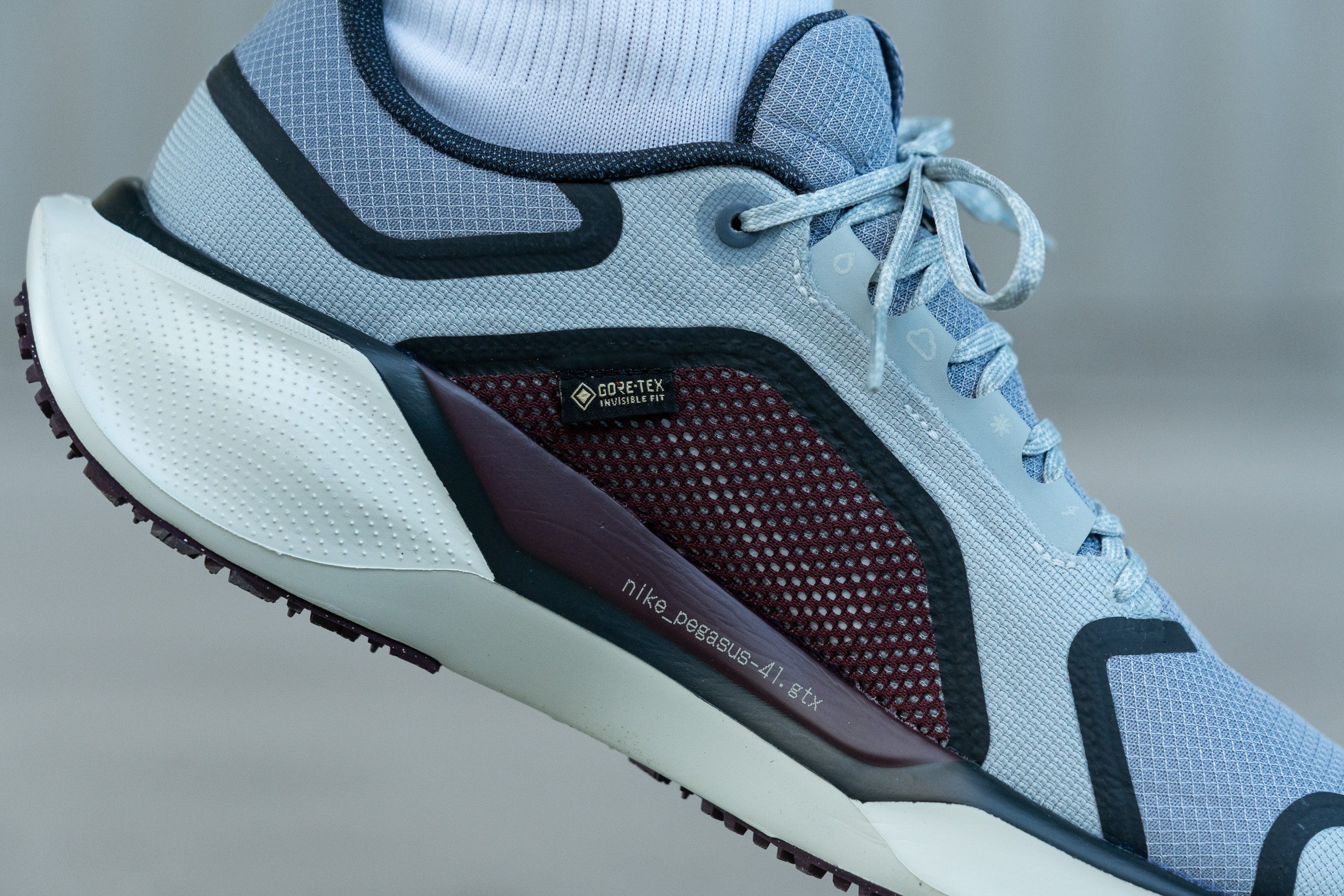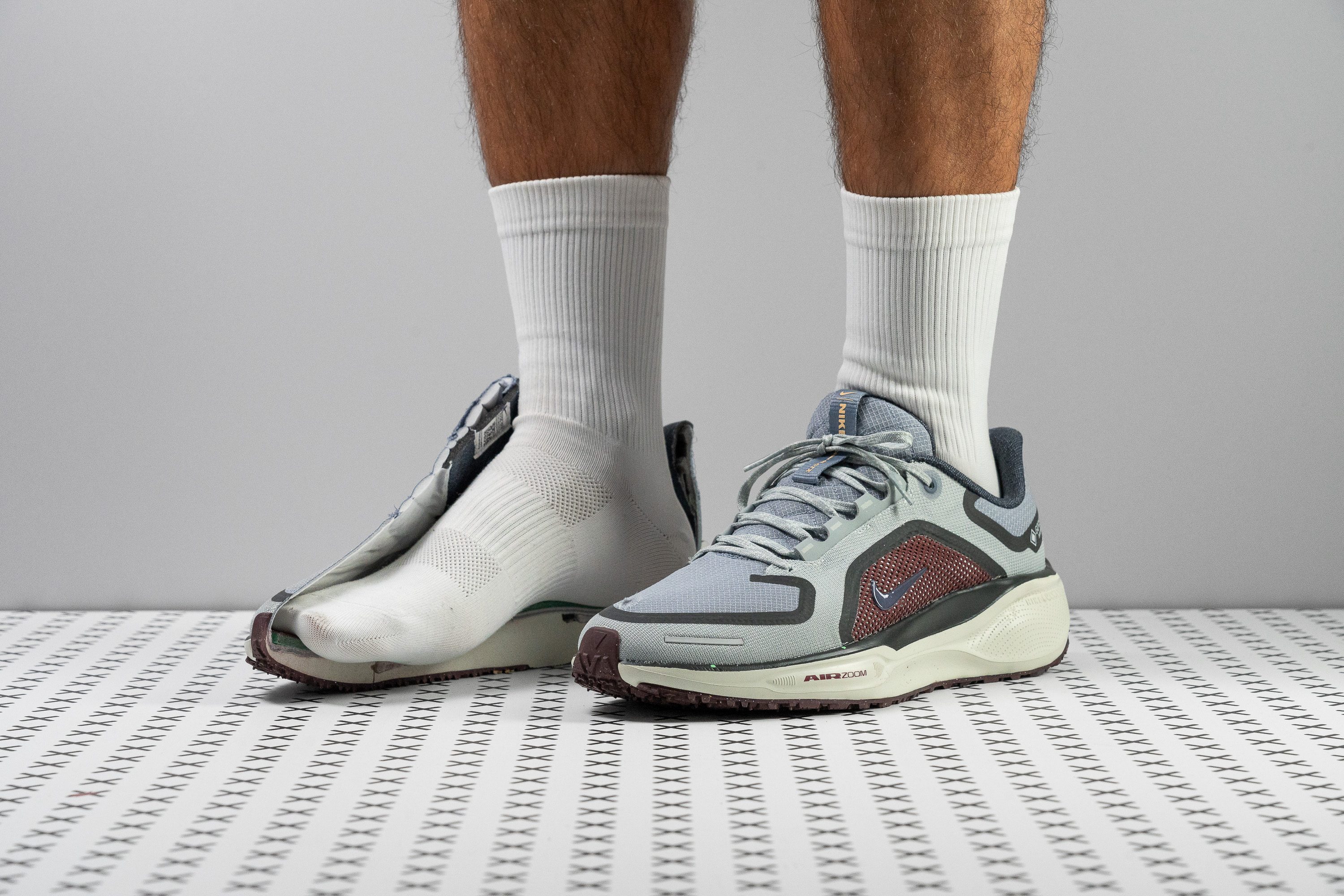Our verdict
- Top pick in best winter running shoes
- Top pick in best waterproof running shoes
Pros
- Waterproof Gore-Tex membrane
- Dual Air Zoom units
- Improved tongue padding
- Durable yet comfy upper
- Rugged toe bumper
- ReactX bouncy foam
- Keeps feet warm
- Reliable grip on wet surfaces
- Amazing for heel strikers
Cons
- Tapered toebox
- Heavy
- Outsole durability concerns
- Maybe a bit pricey
Audience verdict
- Top 27% in waterproof running shoes
- Top 22% in Gore-Tex running shoes
Comparison
The most similar running shoes compared
+ + Add a shoe | |||||
|---|---|---|---|---|---|
| Audience score | 85 Good! | 73 Bad! | 70 Bad! | 87 Great! | |
| Price | $160 | $160 | $170 | $160 | |
| Pace | Daily running | Daily running | Daily running | Daily running | |
| Shock absorption | Moderate | Moderate | - | Moderate | |
| Energy return | Moderate | Low | - | Low | |
| Traction | Moderate | High | - | Moderate | |
| Arch support | Neutral | Neutral | Stability | Neutral | |
| Weight lab Weight brand | 11.1 oz / 315g 10 oz / 283g | 9.2 oz / 261g 9.1 oz / 257g | 11.4 oz / 323g 11.3 oz / 320g | 9.6 oz / 271g 9.6 oz / 272g | |
| Drop lab Drop brand | 11.9 mm 10.0 mm | 11.3 mm 8.0 mm | 8.3 mm 10.0 mm | 8.6 mm 5.0 mm | |
| Strike pattern | Heel | Heel | HeelMid/forefoot | HeelMid/forefoot | |
| Size | True to size | True to size | True to size | True to size | |
| Midsole softness | Soft | Soft | Balanced | Balanced | |
| Difference in midsole softness in cold | Normal | Normal | Small | Small | |
| Toebox durability | Decent | Good | Decent | Good | |
| Heel padding durability | Good | Decent | Bad | Good | |
| Outsole durability | Bad | Good | Good | Good | |
| Breathability | Warm | Warm | Warm | Moderate | |
| Width / fit | Medium | Medium | Narrow | Narrow | |
| Toebox width | Medium | Medium | Medium | Narrow | |
| Stiffness | Moderate | Moderate | Stiff | Stiff | |
| Torsional rigidity | Moderate | Stiff | Stiff | Stiff | |
| Heel counter stiffness | Moderate | Stiff | Stiff | Stiff | |
| Rocker | ✓ | ✗ | ✗ | ✓ | |
| Heel lab Heel brand | 36.3 mm 37.0 mm | 35.4 mm 31.0 mm | 35.8 mm 39.0 mm | 37.2 mm 40.0 mm | |
| Forefoot lab Forefoot brand | 24.4 mm 27.0 mm | 24.1 mm 23.0 mm | 27.5 mm 29.0 mm | 28.6 mm 35.0 mm | |
| Widths available | Normal | NormalWide | Normal | Normal | |
| Orthotic friendly | ✓ | ✓ | ✓ | ✓ | |
| Season | Winter | Winter | Winter | WinterAll seasons | |
| Removable insole | ✓ | ✓ | ✓ | ✓ | |
| Ranking | #226 Bottom 40% | #374 Bottom 2% | #378 Bottom 1% | #157 Top 42% | |
| Popularity | #131 Top 35% | #212 Bottom 44% | #210 Bottom 45% | #59 Top 16% |
Who should buy
The Pegasus 41 GTX isn’t designed for everyone, but it could be an excellent choice for:
- Runners seeking a daily trainer that keeps feet warm and dry in rainy or snowy conditions.
- Those in freezing-cold climates who need reliable grip on wet surfaces and waterproof protection.
- Fans of the Pegasus series looking for a winter-ready version.
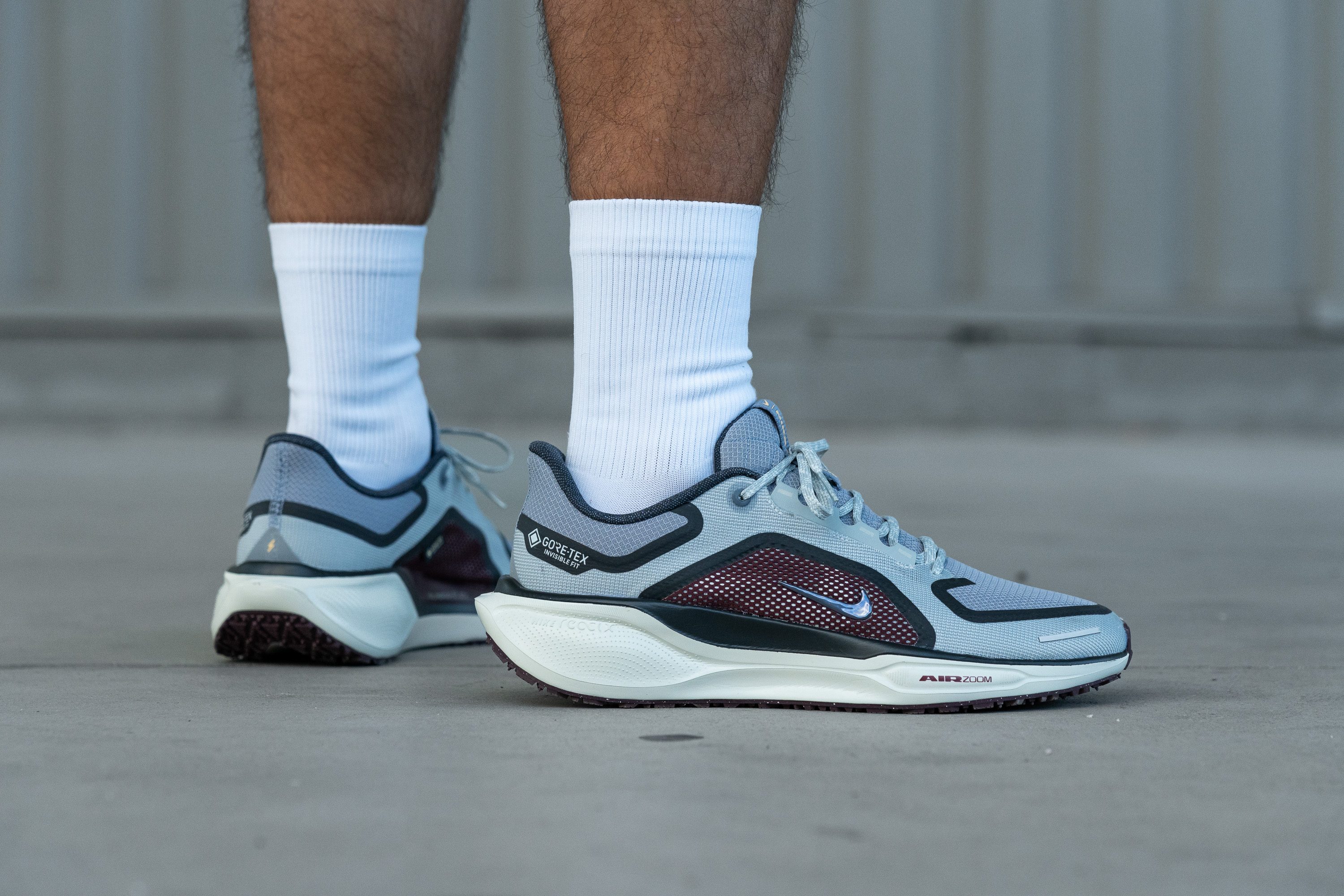
Who should NOT buy
We believe that the Pegasus 41 GTX is not the best option for those seeking a versatile, all-year-round trainer. In our view, its lack of breathability and poor performance on dry surfaces make it unsuitable for regular use outside wet or snowy conditions. If waterproofing isn’t a necessity, we recommend the standard Pegasus 41 or a more versatile door-to-trail option like the Nike Pegasus Trail 5.
Additionally, we think the shoe’s weight is another significant drawback. At 11.1 oz (315g), it’s noticeably heavier than comparable Gore-Tex models like the Hoka Clifton 9 GTX or even the Hoka Challenger 7 GTX.
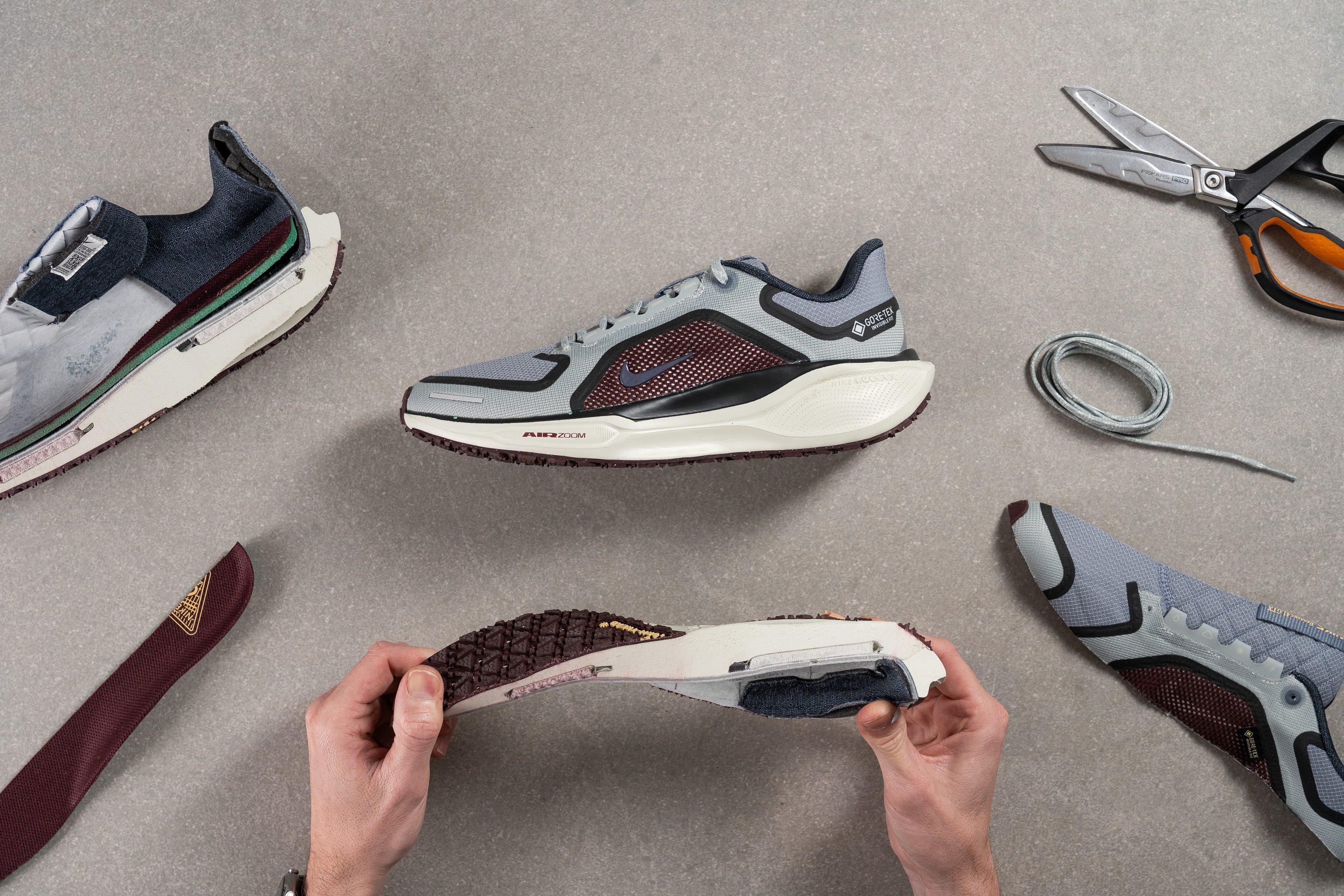
Cushioning
Shock absorption
We tested the GTX version of the Peg 41 and found shock absorption to be average in the heel at 129 SA, with a firmer forefoot measuring just 89 SA. That result was expected, since the midsole remains unchanged from the standard model—only minor differences come from the altered outsole.
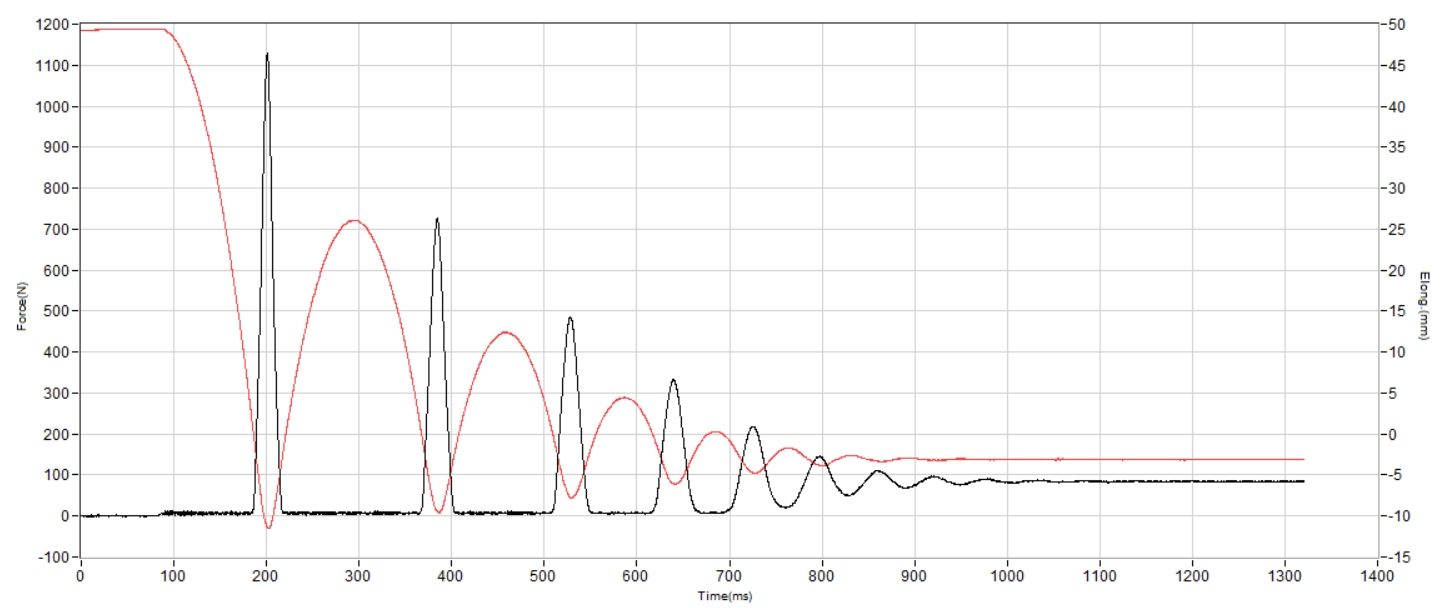
| Pegasus 41 GTX | 129 SA |
| Average | 130 SA |
Energy return
The new ReactX midsole promised great energy return, but it turned out to be just decent. At 56.0% in our test, we weren’t exactly impressed, to be honest.
| Pegasus 41 GTX | 56.0% |
| Average | 58.6% |
Heel stack
Starting with the heel, we measured 36.3 mm—slightly higher than the regular model. This is likely due to the thicker outsole and minor manufacturing tolerances, as the variation is minimal.
With such stack height, this shoe borders on the maximalist category for heel strikers, providing ample cushioning for those who land heavily on the heel. Plus, it includes the added benefit of Air Zoom units, which we’ll discuss shortly.
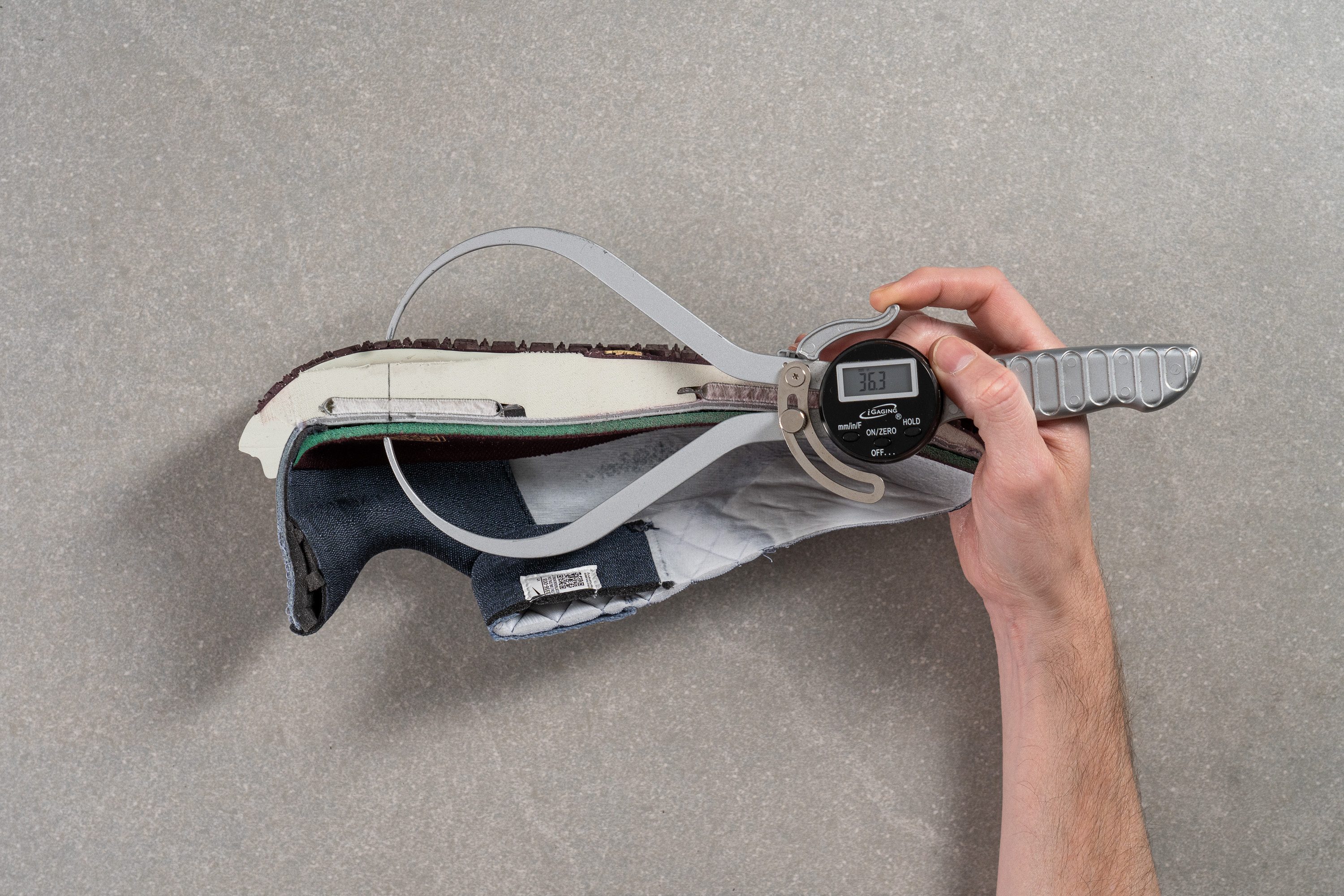
| Pegasus 41 GTX | 36.3 mm |
| Average | 34.8 mm |
Forefoot stack
We measured the forefoot stack at 24.4 mm using our digital caliper, slightly thicker than the regular edition’s 22.2 mm. Despite this increase, the forefoot remains moderately stacked—still below the average for running shoes, as expected from a Pegasus.
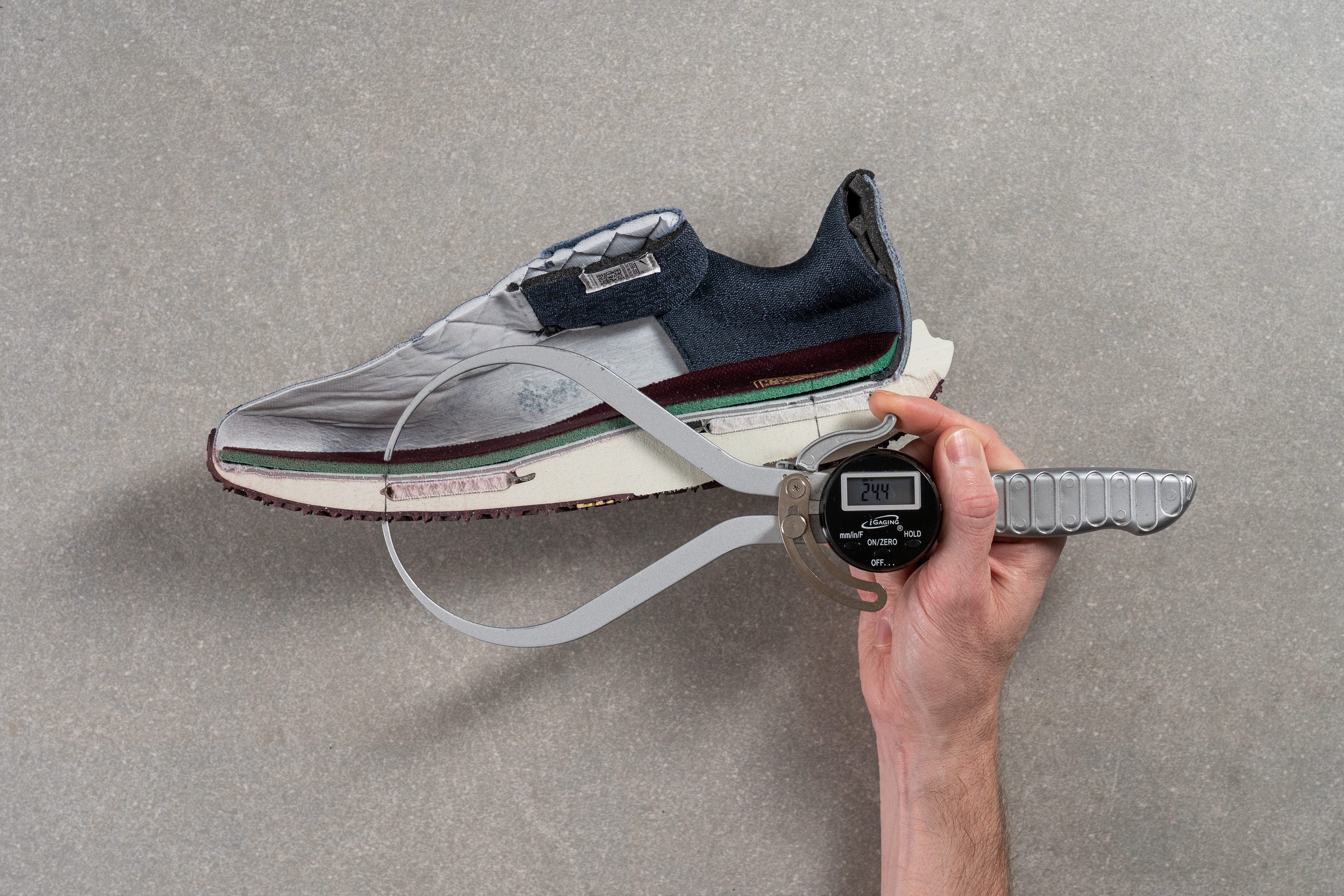
| Pegasus 41 GTX | 24.4 mm |
| Average | 26.2 mm |
Drop
We anticipated a 10-mm drop as per Nike's claims, but our measurement revealed 11.9 mm—a slight increase yet a minor deviation. Still, this high offset makes the shoe even more appealing for extreme heel strikers.
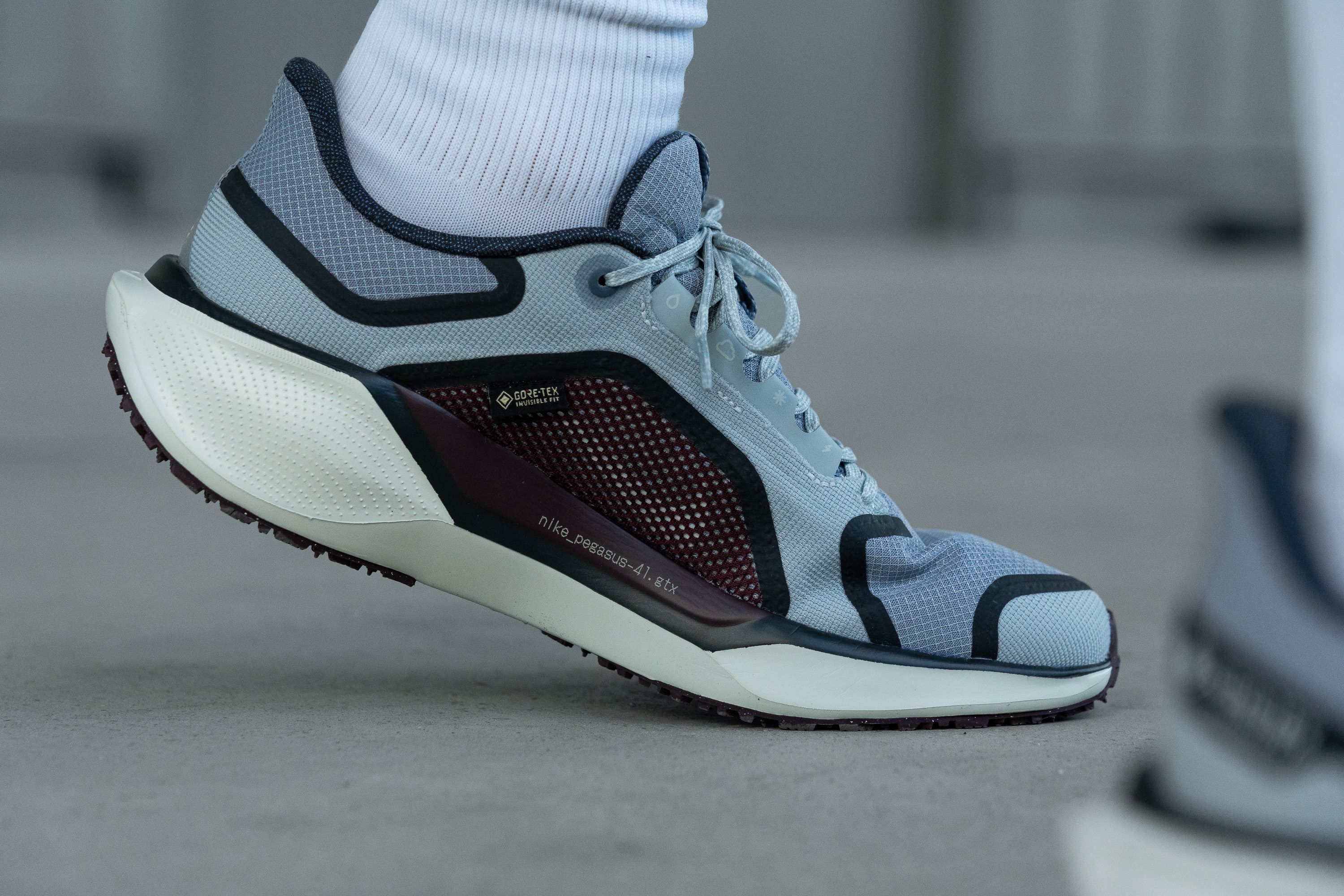
| Pegasus 41 GTX | 11.9 mm |
| Average | 8.6 mm |
Midsole softness
The midsole features Nike's latest ReactX foam, a cutting-edge compound we believe is the brand's finest—ZoomX aside, of course.
The ride delivers a moderately soft feel, and our durometer measured it at 19.5 HA. Bounce-wise, it surpasses the outdated React and vastly outshines EVA-based foams from Nike like Phylon or SR-02.
Additionally, Nike claims—a point we obviously can’t verify but appreciate—that ReactX reduces the carbon footprint by 43% compared to its predecessor.
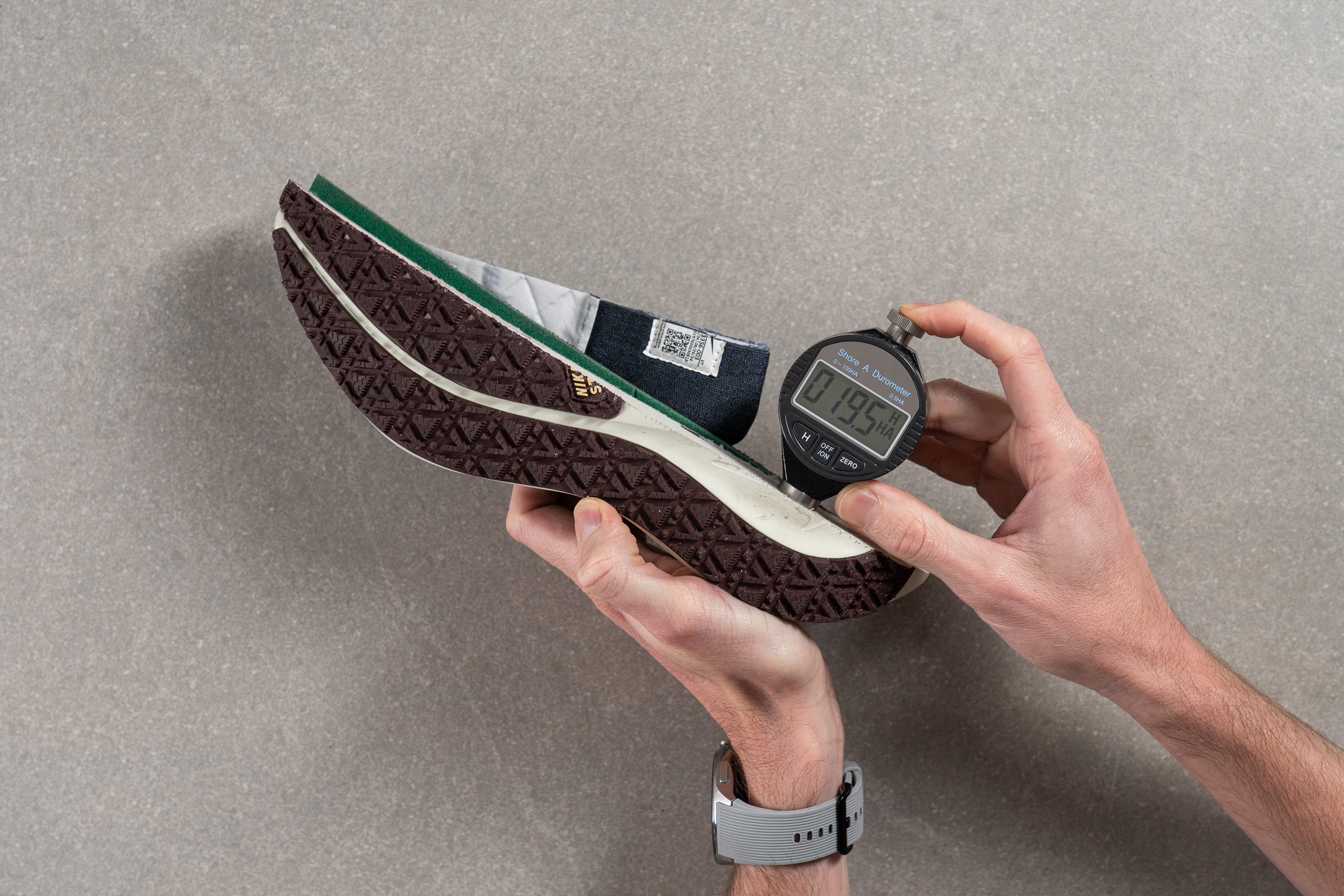
| Pegasus 41 GTX | 19.5 HA |
| Average | 20.4 HA |
Rocker
In our view, the Pegasus 41 GTX shines as a fantastic choice for heel strikers, and the well-crafted rocker design we tested only strengthens this conclusion. In fact, v41 boasts the best heel curvature we’ve seen in a Pegasus!
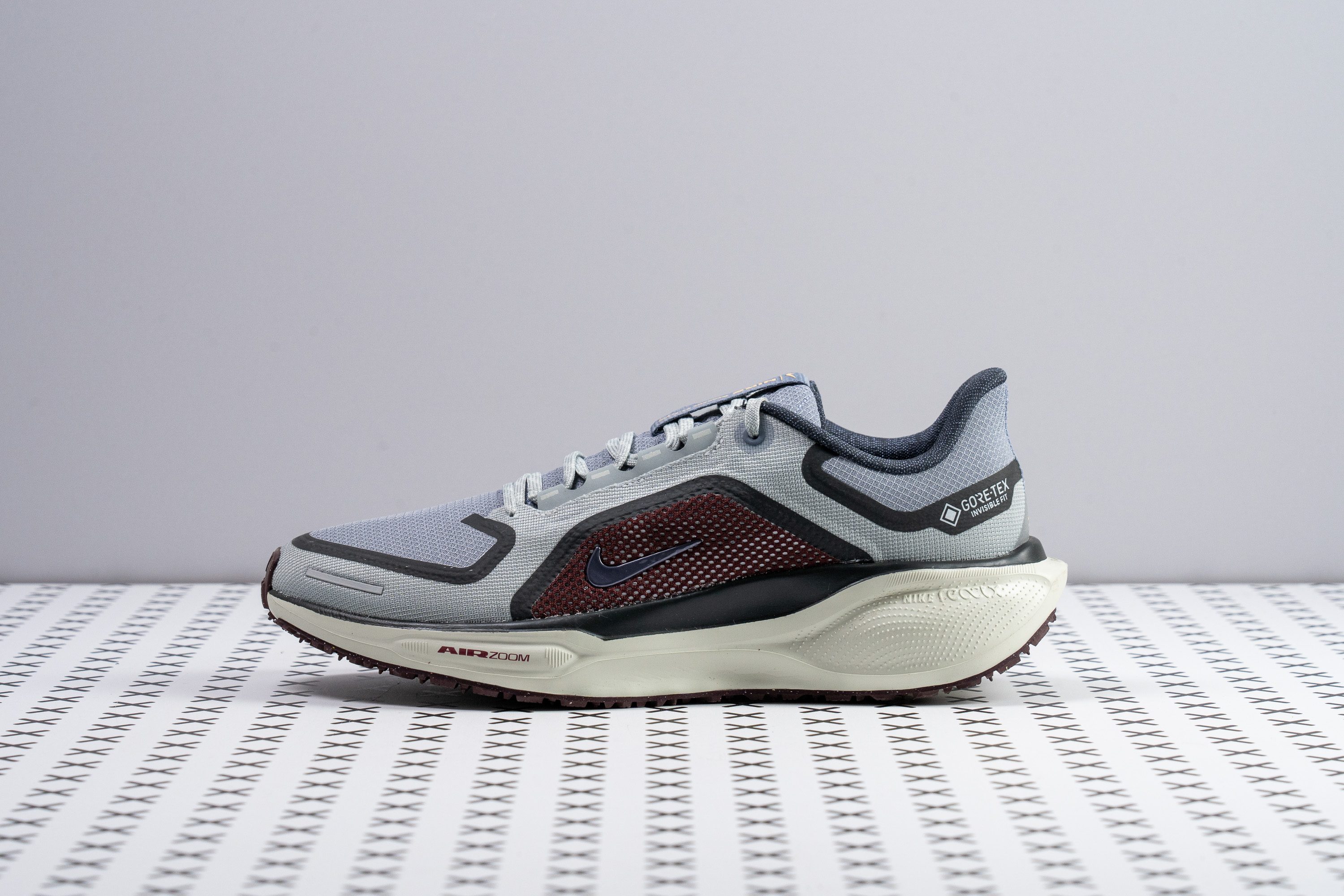
Air Zoom
The Pegasus 41 GTX also features dual Air Zoom units—one in the forefoot and one in the heel—for enhanced cushioning and energy return.
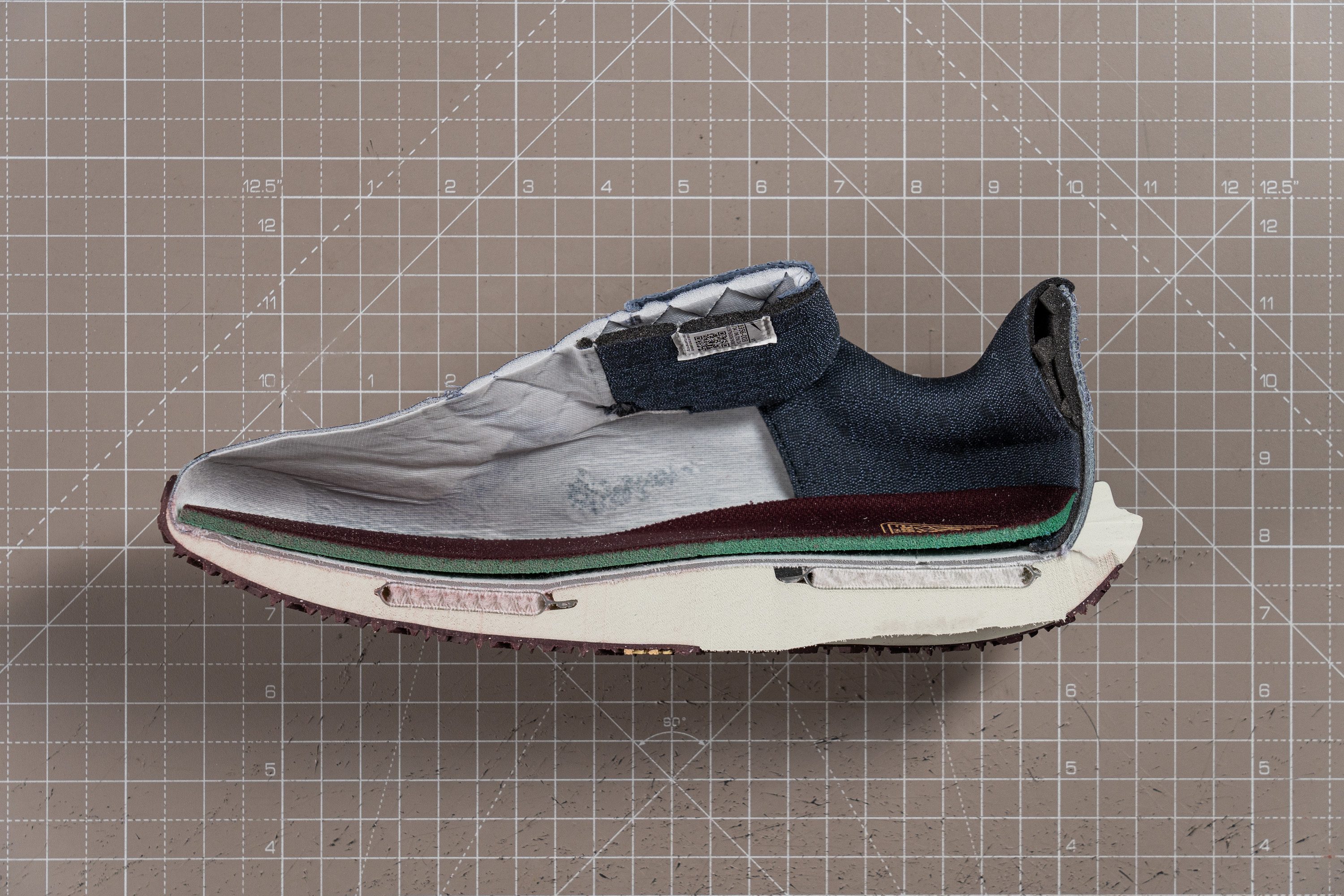
Size and fit
Size
Nike Pegasus 41 GTX fits true to size (131 votes).
Internal length
| Pegasus 41 GTX | 273.0 mm |
| Average | 269.4 mm |
Width / Fit
Nike has been gradually increasing the width over recent years, a trend evident in models like the Vomero 17 and Pegasus 41, and this shoe follows suit as it uses the same MR-10 last.
To be more precise with our fit assessments, we created a mold of the shoe's interiors using proprietary gel.
The mold indeed showed a noticeably roomy metatarsal area with an above-average reading of 97.1 mm. However, there is a good reason why this Nike shoe doesn't get the "roomy" award.
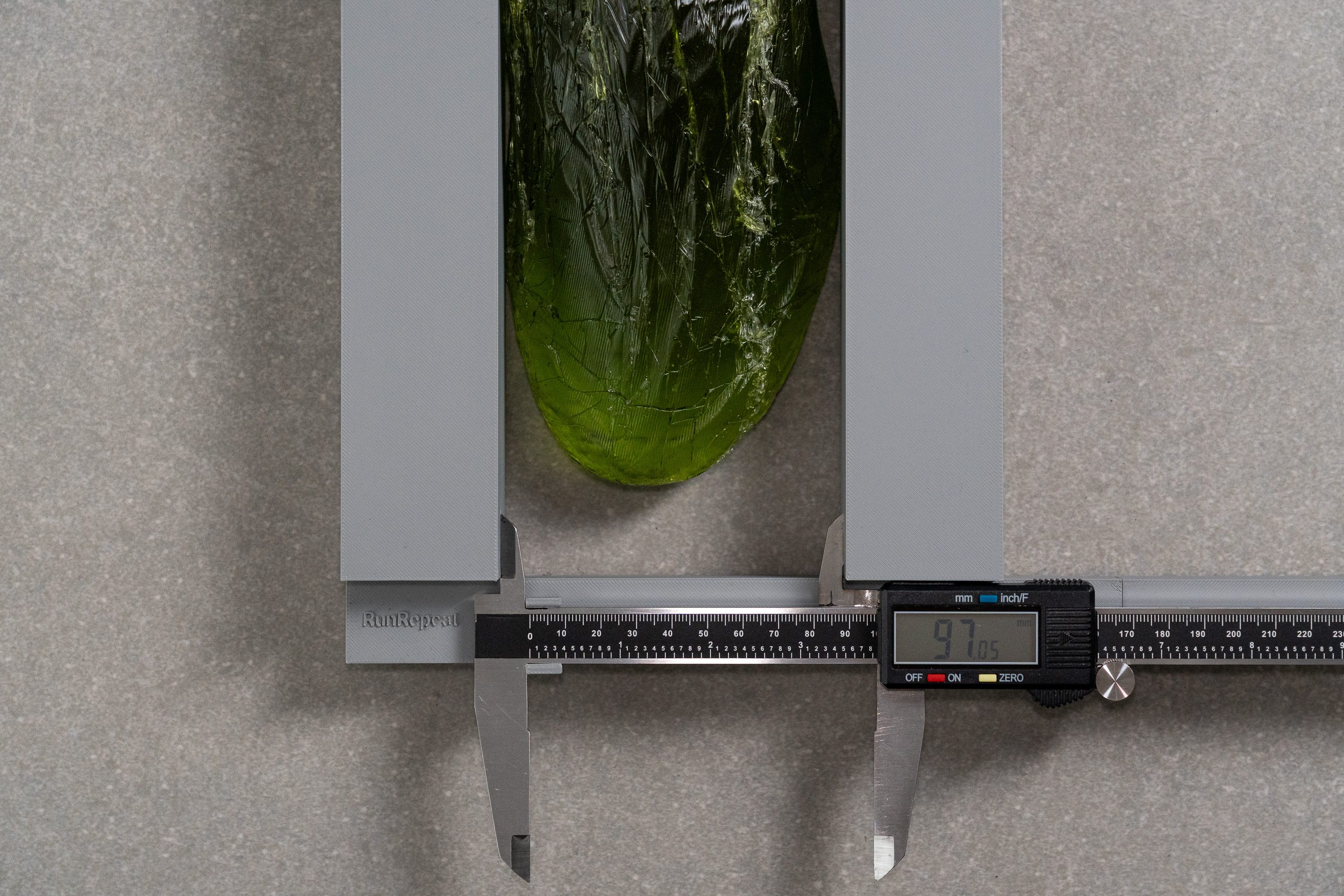
| Pegasus 41 GTX | 97.1 mm |
| Average | 95.1 mm |
Toebox width
If you're a regular visitor to RunRepeat, you know that our fit analysis includes more than just one measurement. We also check the big toe area of the shoe's mold to check if its toebox shape changes towards the front.
The Pegasus 41 GTX is a vivid example of a shoe that gets notably narrower towards the toes, showing 71.7 mm in the big toe area. Even though it is only slightly narrower than average, it is narrow in contrast to the shoe's widest part.
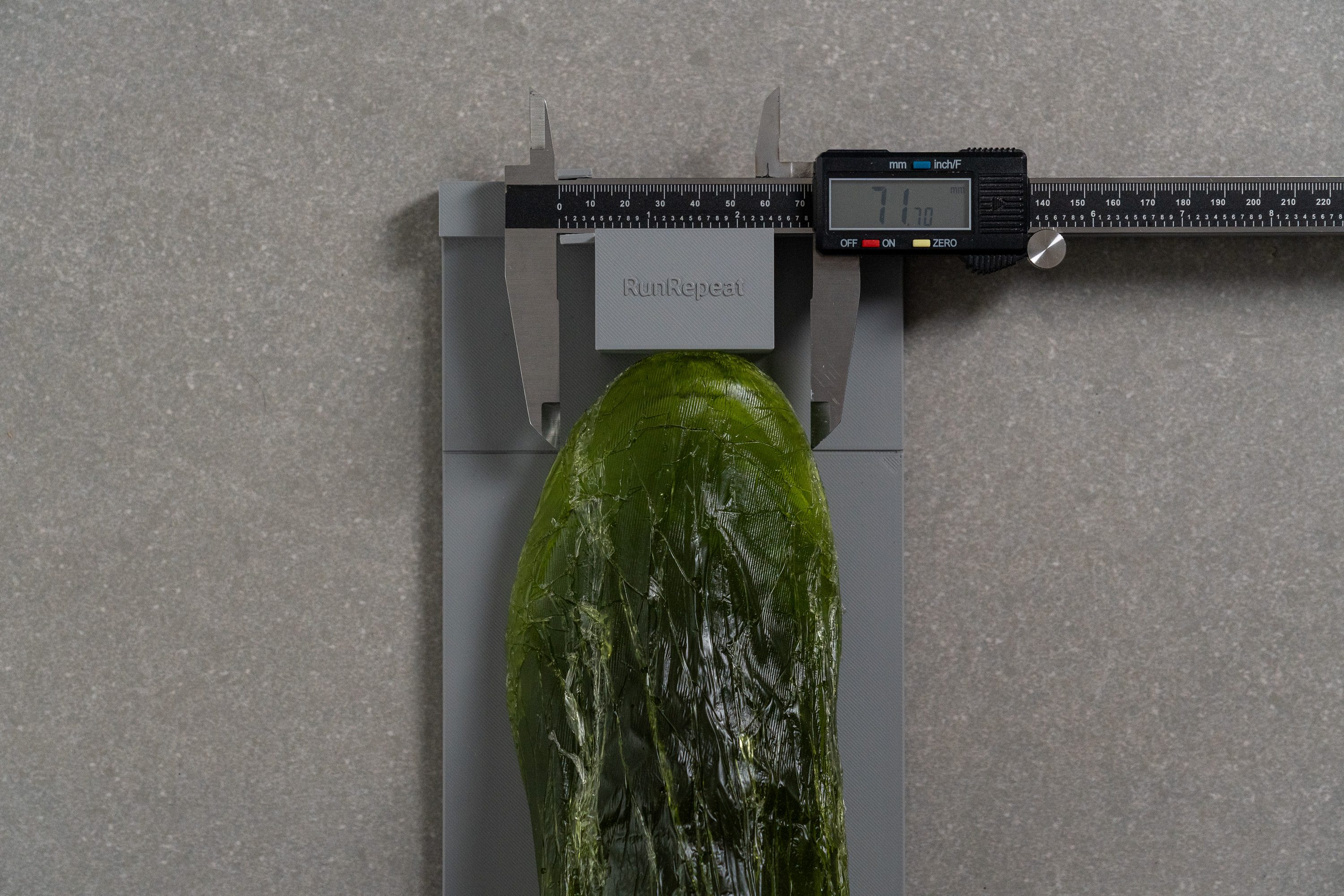
| Pegasus 41 GTX | 71.7 mm |
| Average | 73.3 mm |
Toebox height
A shallower toebox and a thicker Gore-Tex upper also contribute to the shoe's cramped toe area. We found that it limits the vertical space more than expected with a caliper reading of 22.4 mm.
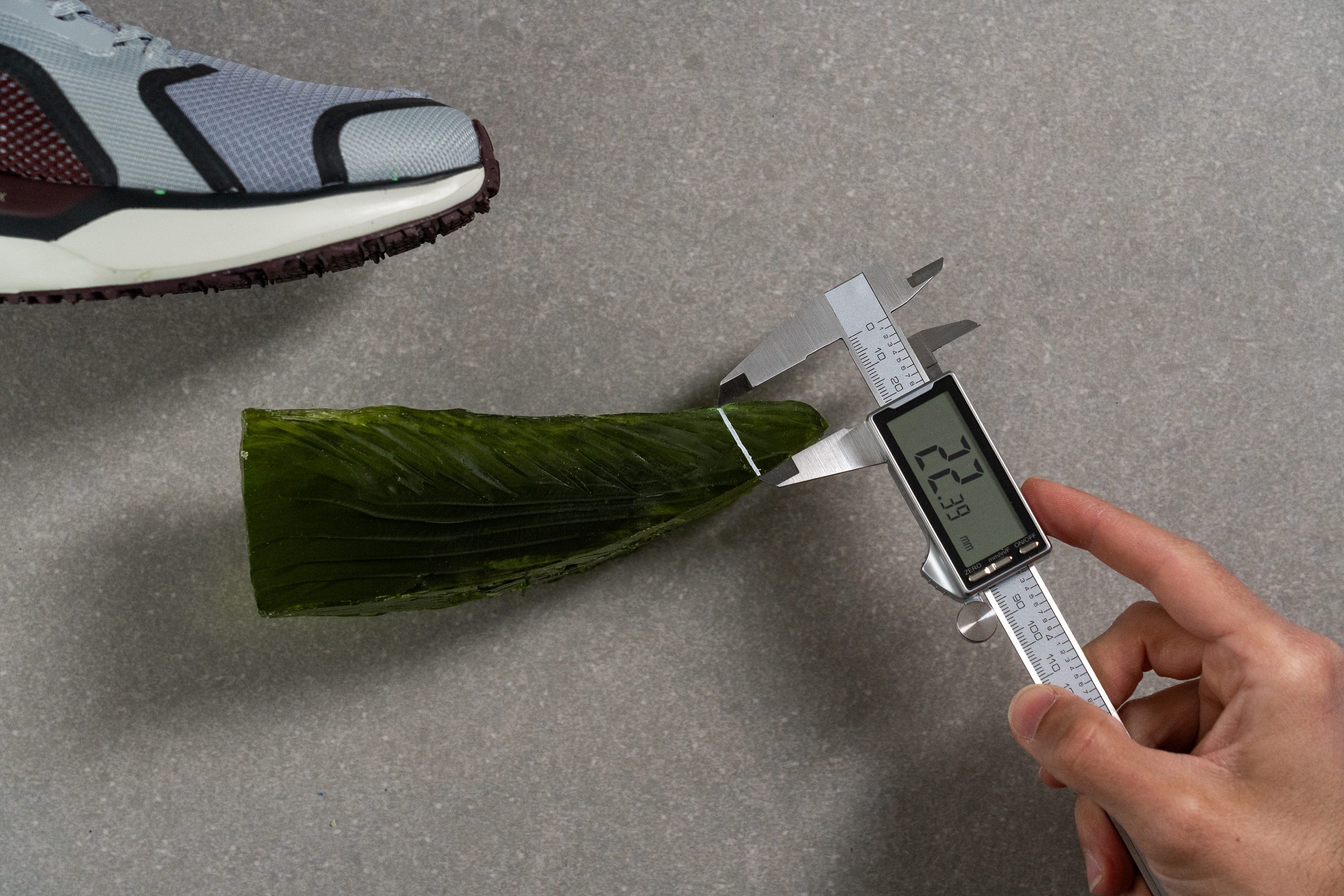
This can be a hazard for people running longer distances or have a history of toe issues (i.e. black toenails).
| Pegasus 41 GTX | 22.4 mm |
| Average | 27.0 mm |
Traction / Grip
Traction test
A 0.41 score in our wet-grip test provides sufficient security for tackling various weather conditions, though it’s not exactly a top-tier result. We’d like to see a slight step forward in this area for the next version.
| Pegasus 41 GTX | 0.41 |
| Average | 0.49 |
Outsole design
Storm-Tread is a new rubber from Nike. Instead of borrowing something from their trail lineup like ATC or partnering with Vibram, they created a material specifically tailored for wet conditions. We discovered that the Storm-Tread rubber outsole incorporates a cleverly textured pattern with micro-grooves, while the multidirectional shapes effectively channel water away.
However, on dry surfaces, it performs worse than a regular Pegasus—again, similar to how winter tires from cars function less effectively on dry roads.
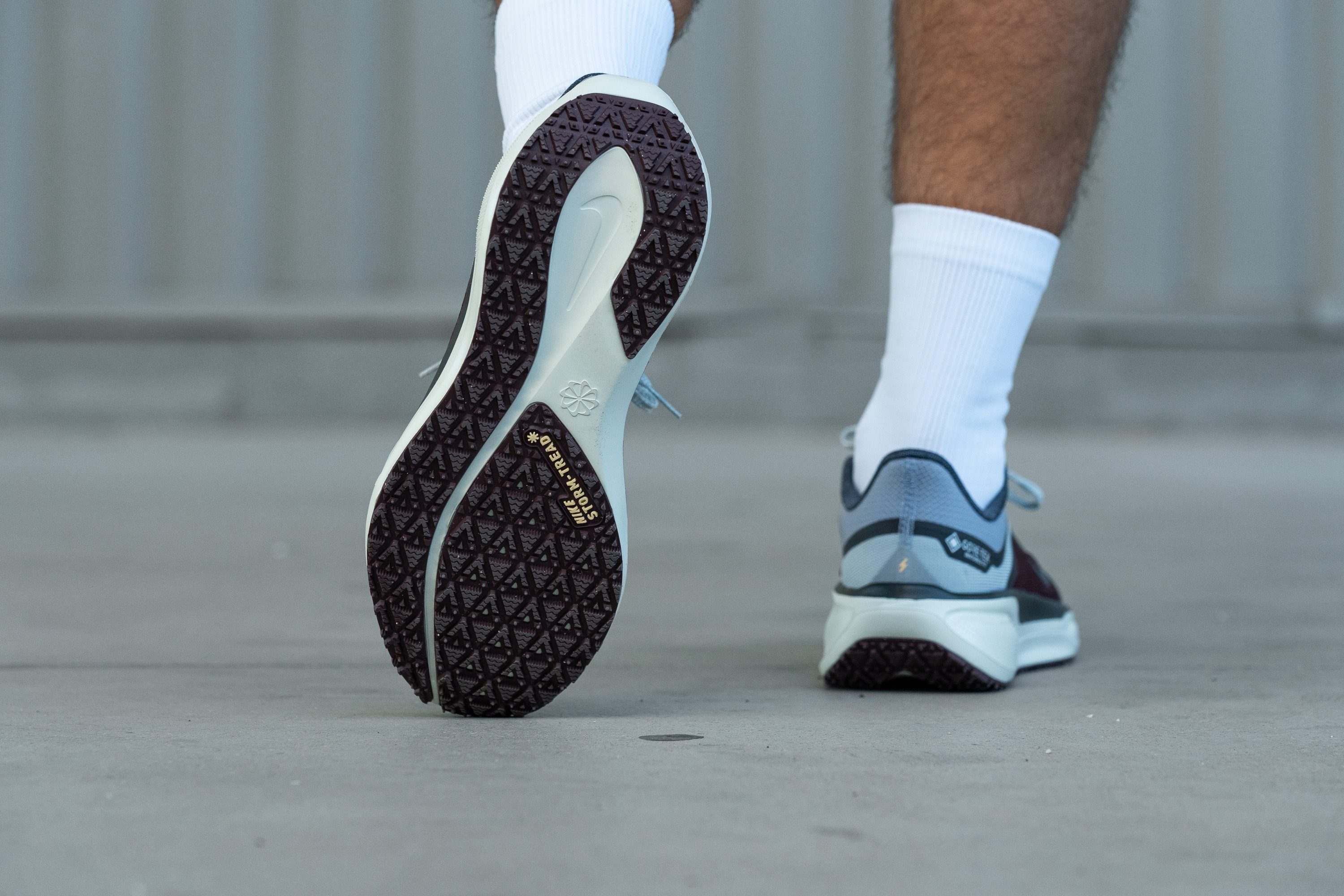
Flexibility / Stiffness
The Nike Pegasus 41 GTX remains a flexible running shoe, scoring 12.6N in our 30-degree bend test. That’s slightly higher than the 9.4N from the standard Pegasus 41—something we anticipated given the all-weather outsole.
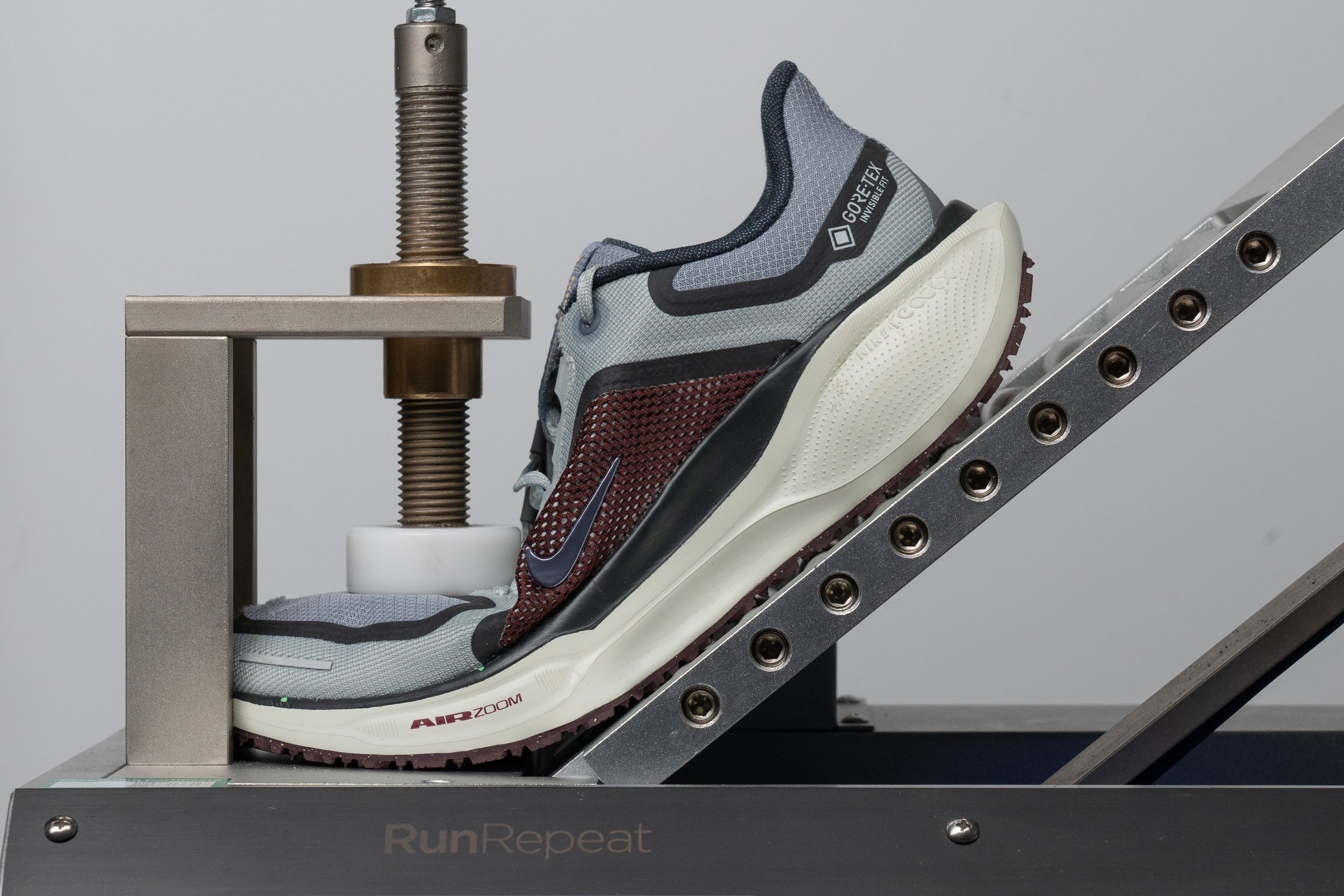
| Pegasus 41 GTX | 12.6N |
| Average | 15.3N |
Weight
It’s puzzling that Nike lists the same official weight for both the Gore-Tex and regular models, but we know that’s unrealistic. Gore-Tex is heavier, and the Storm-Tread outsole contributes additional weight too.
On our scale, the shoe registered 11.1 oz (315g), which is 1.2 oz (34g) heavier than the regular edition. While noticeable, we think this increase is justified by the added materials. And it’s a clear reminder that relying on lab tests, rather than brand claims, is essential for accurate data.
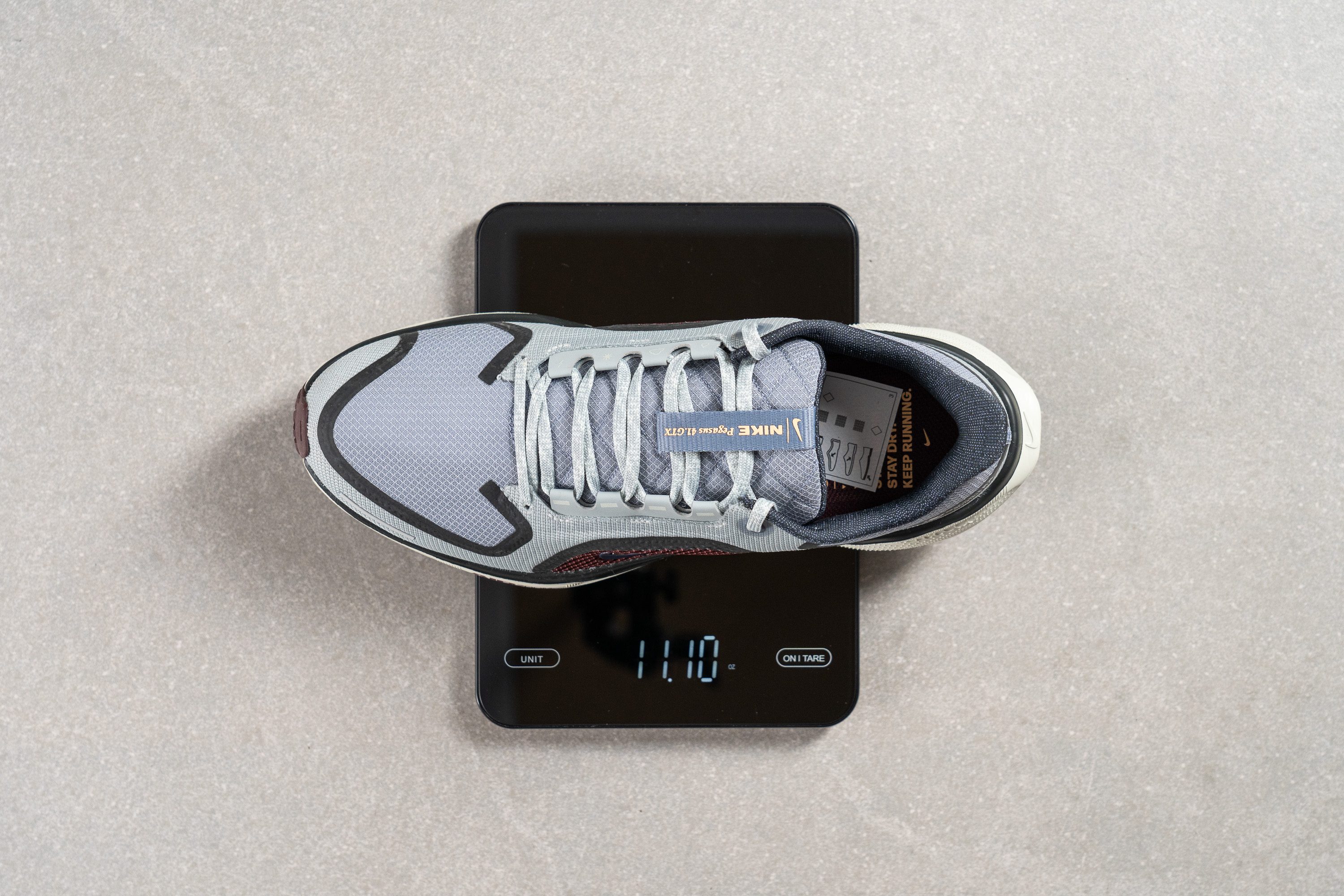
| Pegasus 41 GTX | 11.1 oz (315g) |
| Average | 9.3 oz (264g) |
Breathability
Gore-Tex is a waterproof membrane designed to repel liquid while allowing water vapor to escape—a solution for keeping your feet dry in wet conditions. However, in our experience lab testing shoes, the ventilation tends to be limited despite Gore-Tex’s claims.
Our light test confirmed this observation, particularly in the toebox, which was heavily blocked. While certain areas in the medial zone allow for a slight amount of airflow, the shoe’s design is clearly more focused on waterproofing than breathability. This makes sense for a winter-oriented shoe anyway.
For further proof, we turned to our microscope, and the results were telling. It was nearly impossible to identify spots where air could escape easily.
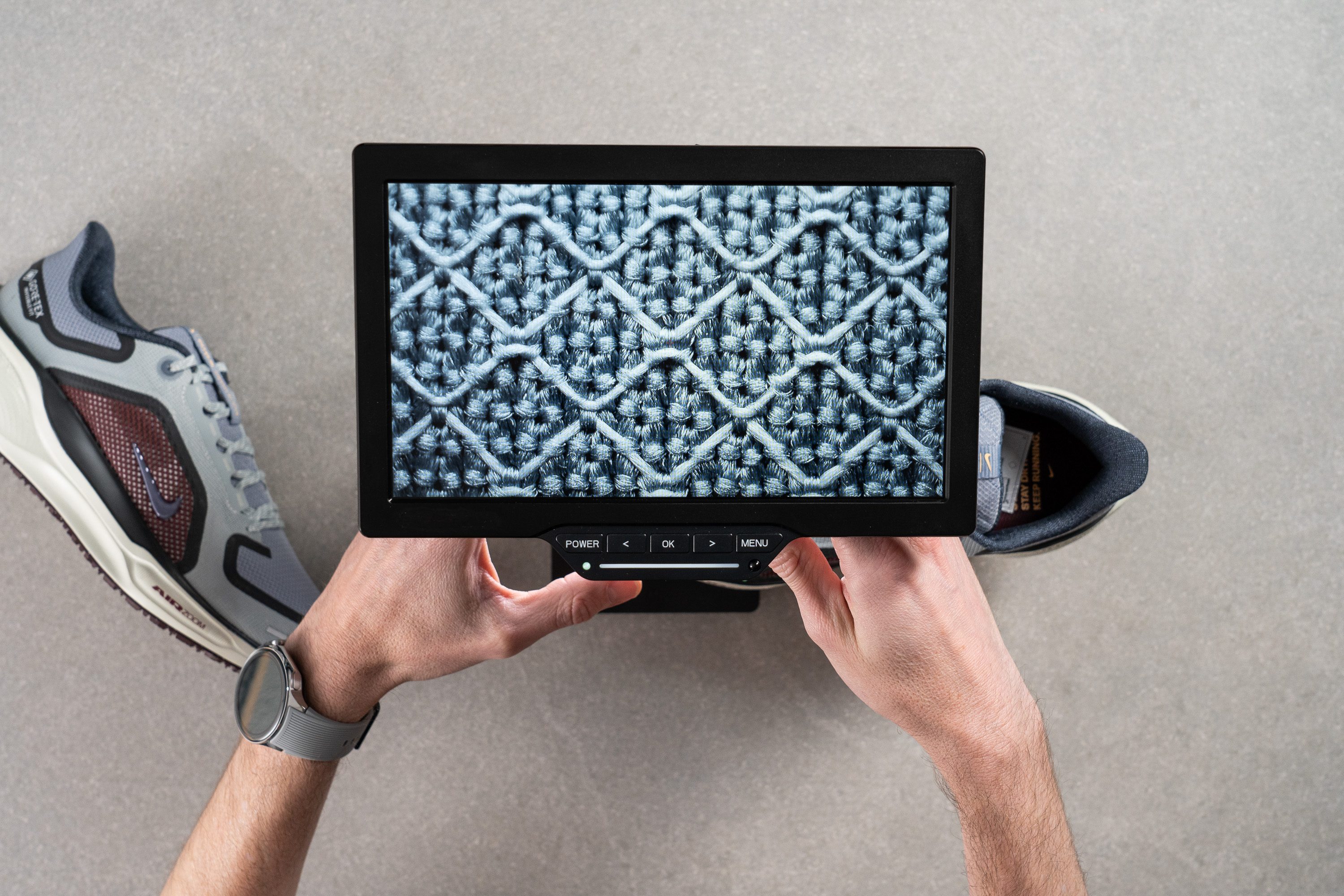
While it may not offer top-tier breathability, the exceptional build quality of Gore-Tex products is undeniable—our microscopic photo provides clear evidence of that.
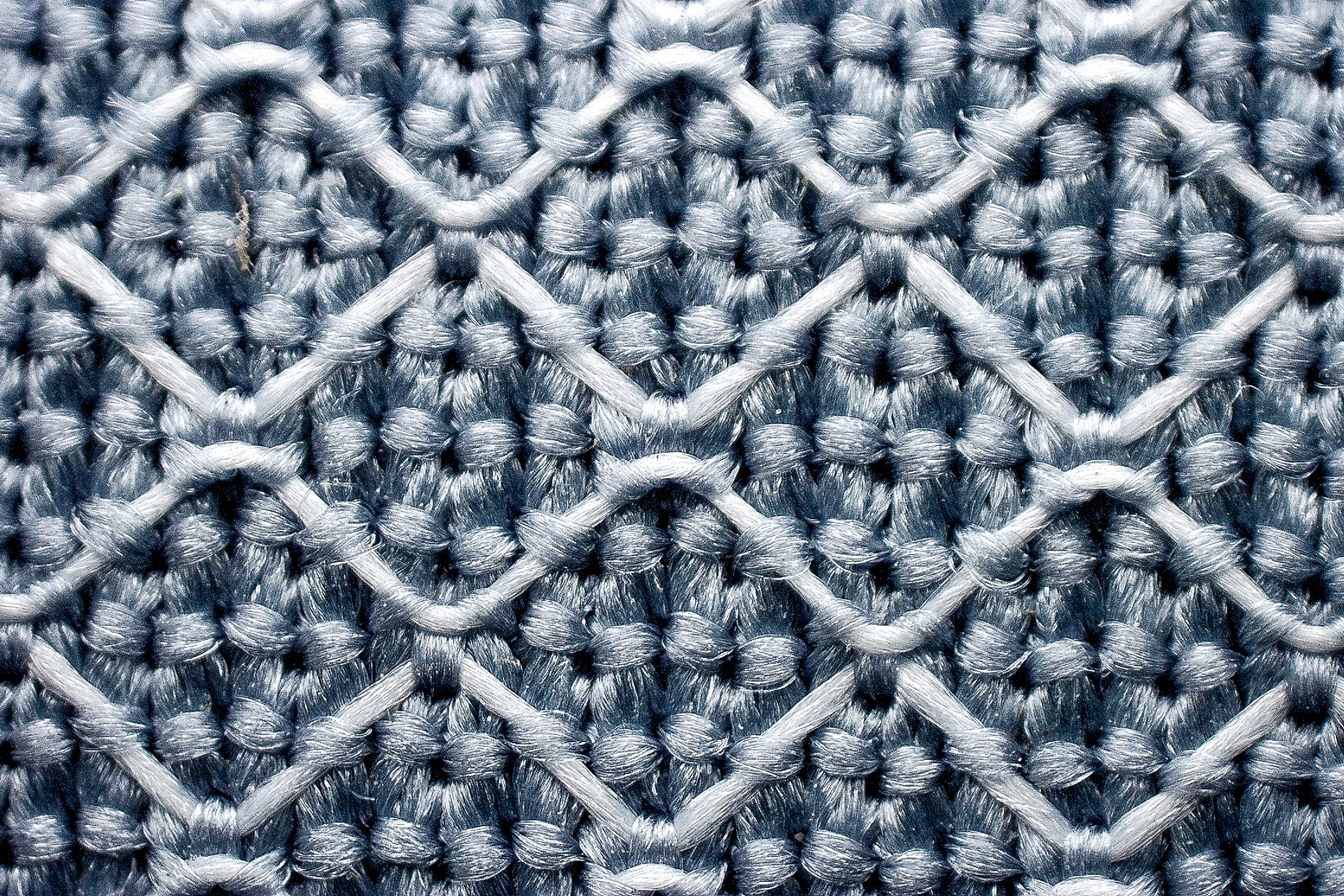
The upper construction of this model closely mirrors that of the Pegasus 41, but with noticeable differences. It features additional padding in the toebox, which enhances warmth and comfort in cold weather, making this variant ideal for winter use.
We also noted that Nike included a rugged toe bumper in this version, setting it apart from the standard Pegasus. Paired with the Storm-Tread outsole, we believe this model can serve as a door-to-trail option.
| Pegasus 41 GTX | 1 |
| Average | 3.7 |
Stability
Lateral stability test
Right from the start, we found this model to offer noticeably more support than many daily trainers, despite being crafted as a pure neutral shoe.
This enhanced stability comes from the raised midsole sidewalls and the flared heel design—features we highlighted earlier in this lab review when discussing the updated rocker and heel bevel. However, runners with significant stability needs may find it lacking due to its moderate midsole dimensions.
Torsional rigidity
We began our assessment by testing the torsional rigidity of the Pegasus 41 GTX, which scored 3 out of 5. Meanwhile, the non-GTX version got a 2/5.
In our view, this reduction in flexibility is attributed to the updated Storm-Tread outsole and the firmer, weather-resistant upper.
| Pegasus 41 GTX | 3 |
| Average | 3.5 |
Heel counter stiffness
The heel counter differs slightly from the regular edition, offering a bit more flexibility with a score of 3/5, although the change is subtle and barely noticeable during wear.
| Pegasus 41 GTX | 3 |
| Average | 2.9 |
Midsole width - forefoot
While many brands, like ASICS with the Novablast 4, are embracing wider midsoles, we found that Nike stays true to the Pegasus series’ classic design, delivering a traditional daily trainer feel with retained agility.
Using our digital calipers, we measured the forefoot at 113.5 mm—just around what we expected!
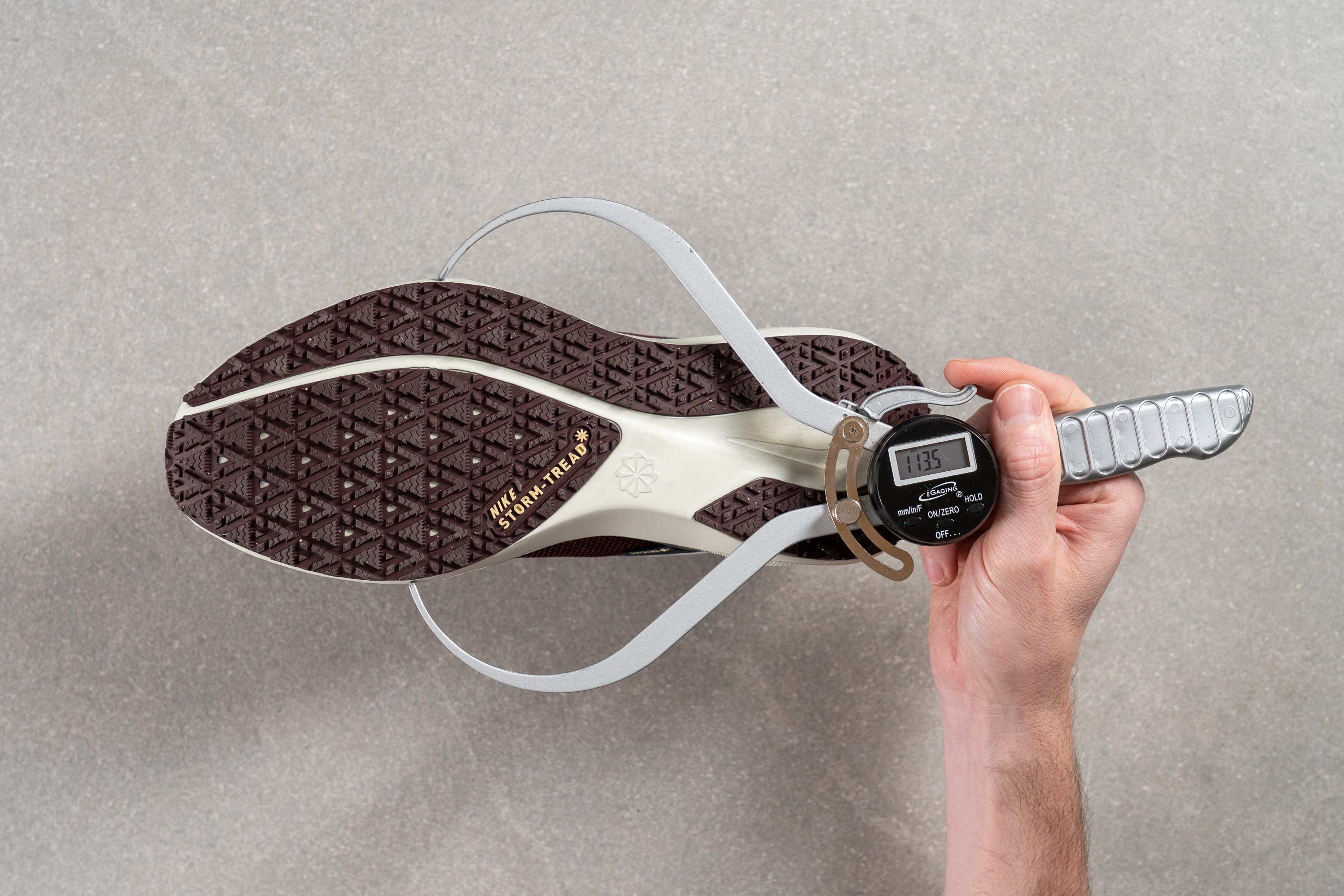
| Pegasus 41 GTX | 113.5 mm |
| Average | 114.4 mm |
Midsole width - heel
The heel follows similar design principles, delivering a moderate width of 91.3 mm. This strikes a balanced mix of stability and nimbleness—perfect for versatility.
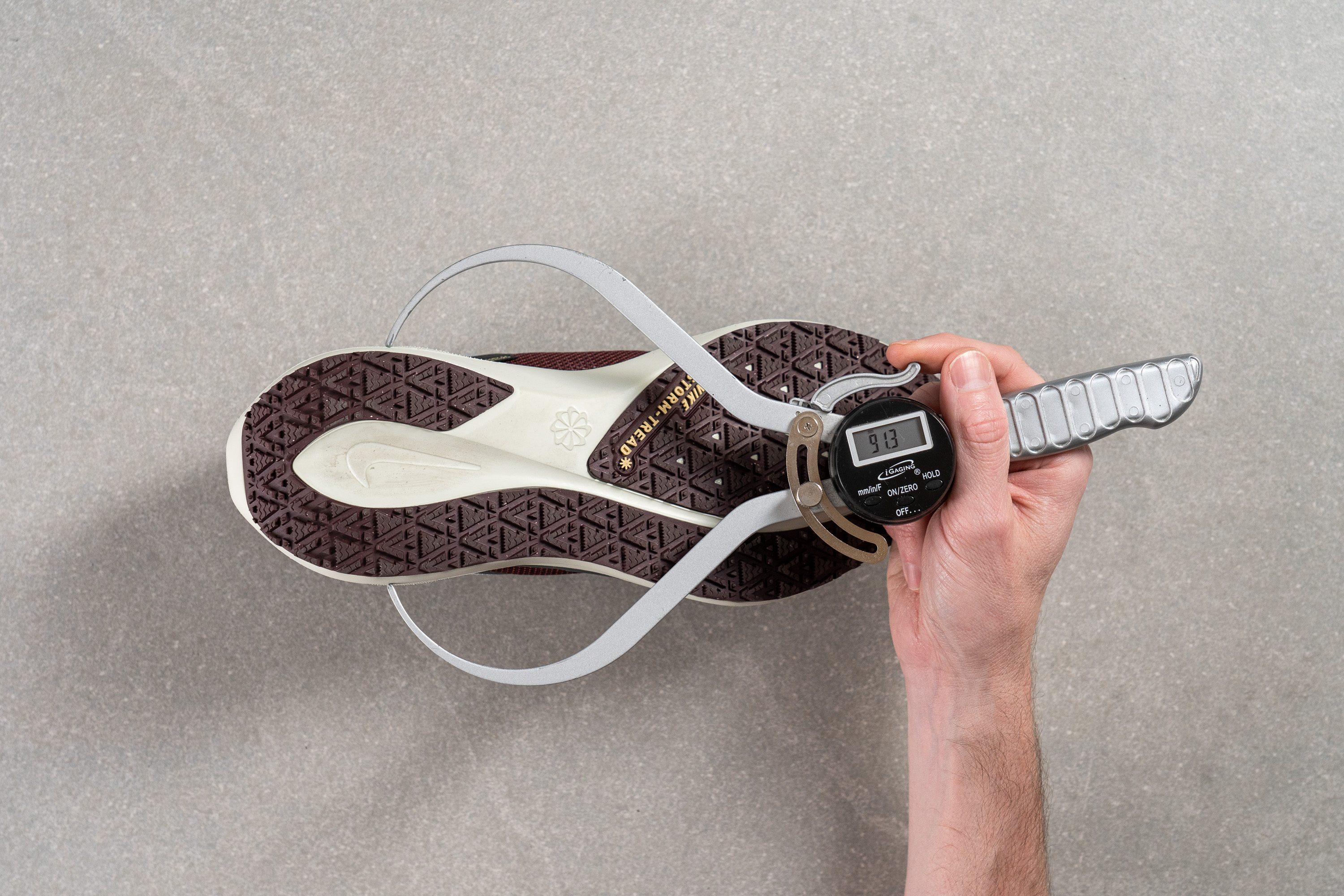
| Pegasus 41 GTX | 91.3 mm |
| Average | 90.6 mm |
Durability
Toebox durability
Having a thicker upper with nearly zero ventilation suggested good durability, so we put it to the test using our Dremel like we do in all shoes. This process aims to reveal how well the Gore-Tex layer withstands abrasion.
After testing, we analyzed the outcome and rated it 3/5. While slightly underwhelming for a GTX upper, in our view, it still delivers decent resilience. However, the layer closest to the foot proved to be the most durable, offering a reassuring level of protection and longevity for everyday use.
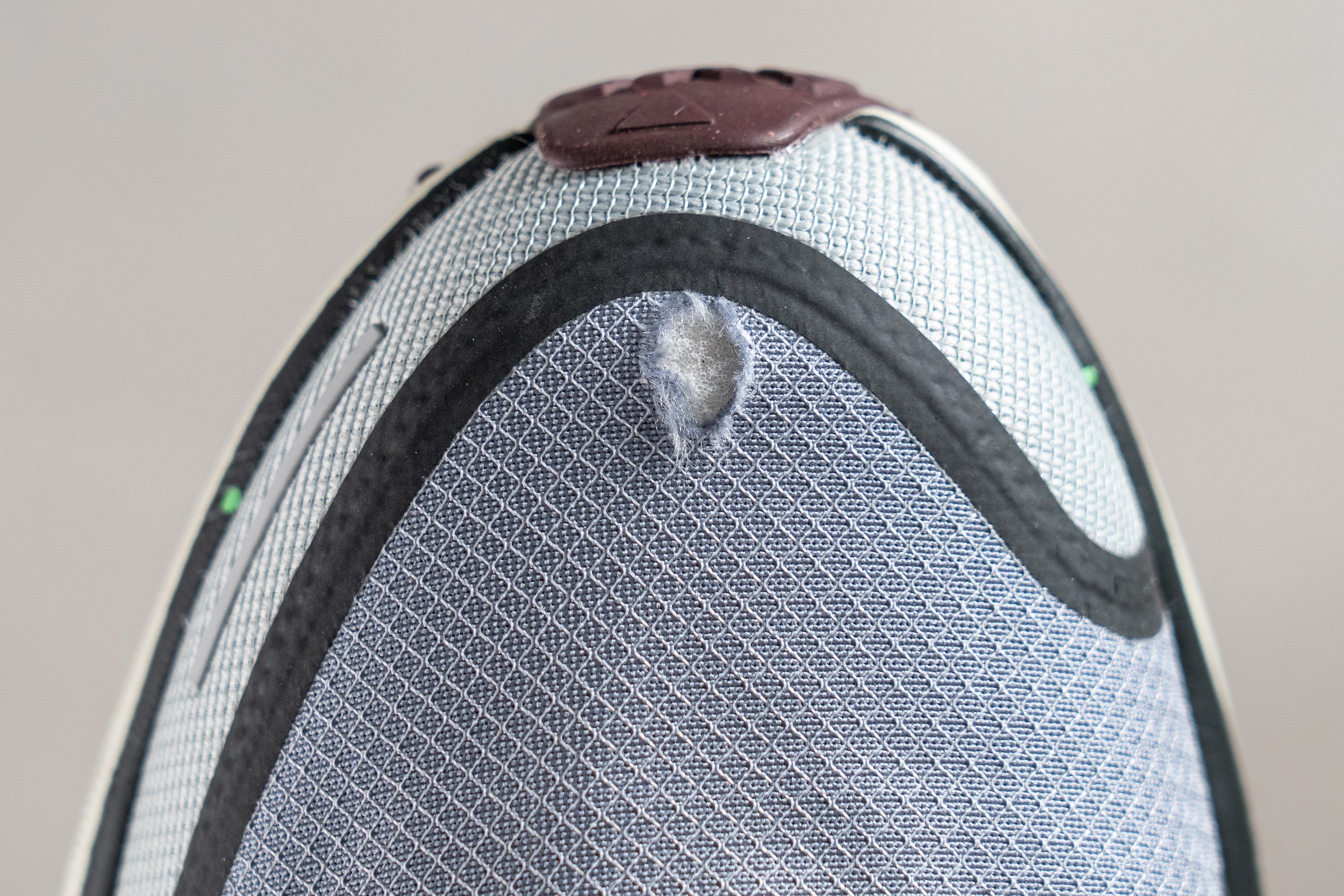
| Pegasus 41 GTX | 3 |
| Average | 2.6 |
Heel padding durability
At first glance, the heel design seemed indistinguishable from any average daily trainer on the market—but we were eager to put it to the test.
Through our evaluation, we discovered an impressive result—a solid 4/5 rating!
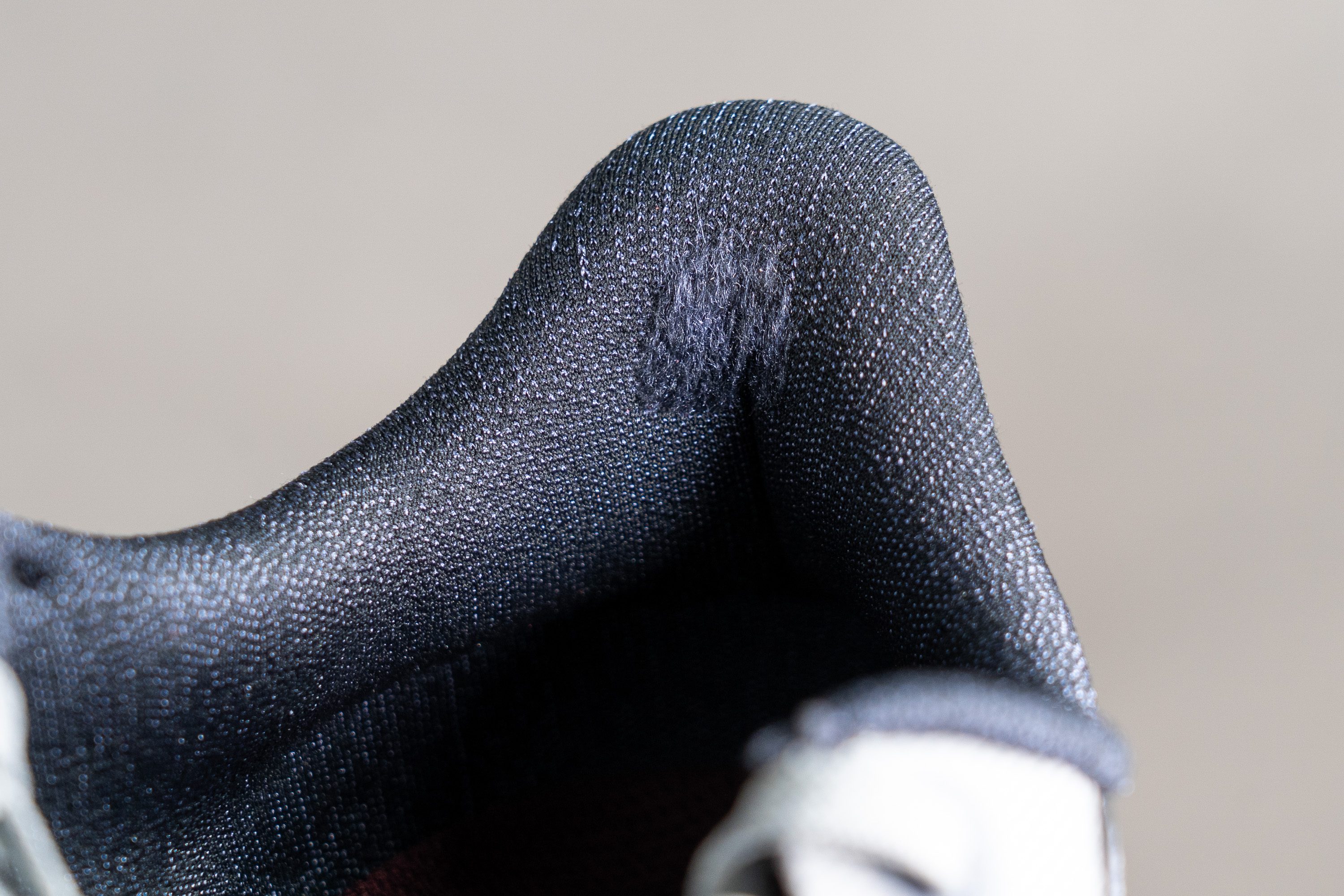
| Pegasus 41 GTX | 4 |
| Average | 3.4 |
Outsole hardness
Apart from the Gore-Tex upper, the most significant update in the Pegasus 41 GTX is the new Storm-Tread outsole. Using our Shore C durometer, we measured its hardness at 81.4 HC—perfectly average for daily trainers.
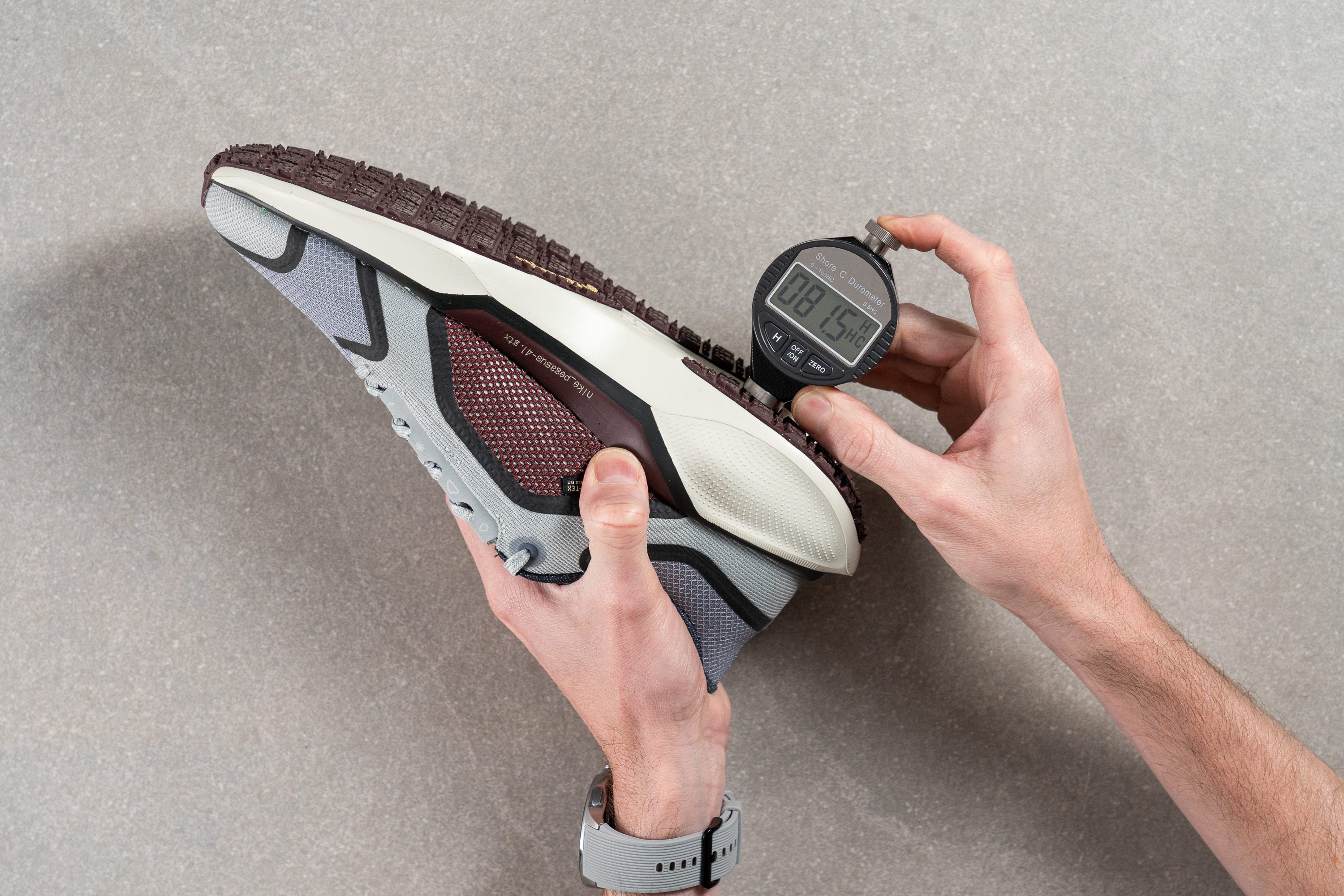
| Pegasus 41 GTX | 81.4 HC |
| Average | 79.2 HC |
Outsole durability
While the outsole excels in wet conditions, it faces a familiar issue—like winter tires on cars, it wears out rapidly on dry surfaces.
After testing with our Dremel, we discovered a concerning 2.2-mm dent. In our view, this result highlights poor durability on dry terrain. However, considering this is a Gore-Tex shoe intended for wet environments, the outcome feels less alarming than it would in a standard running shoe.
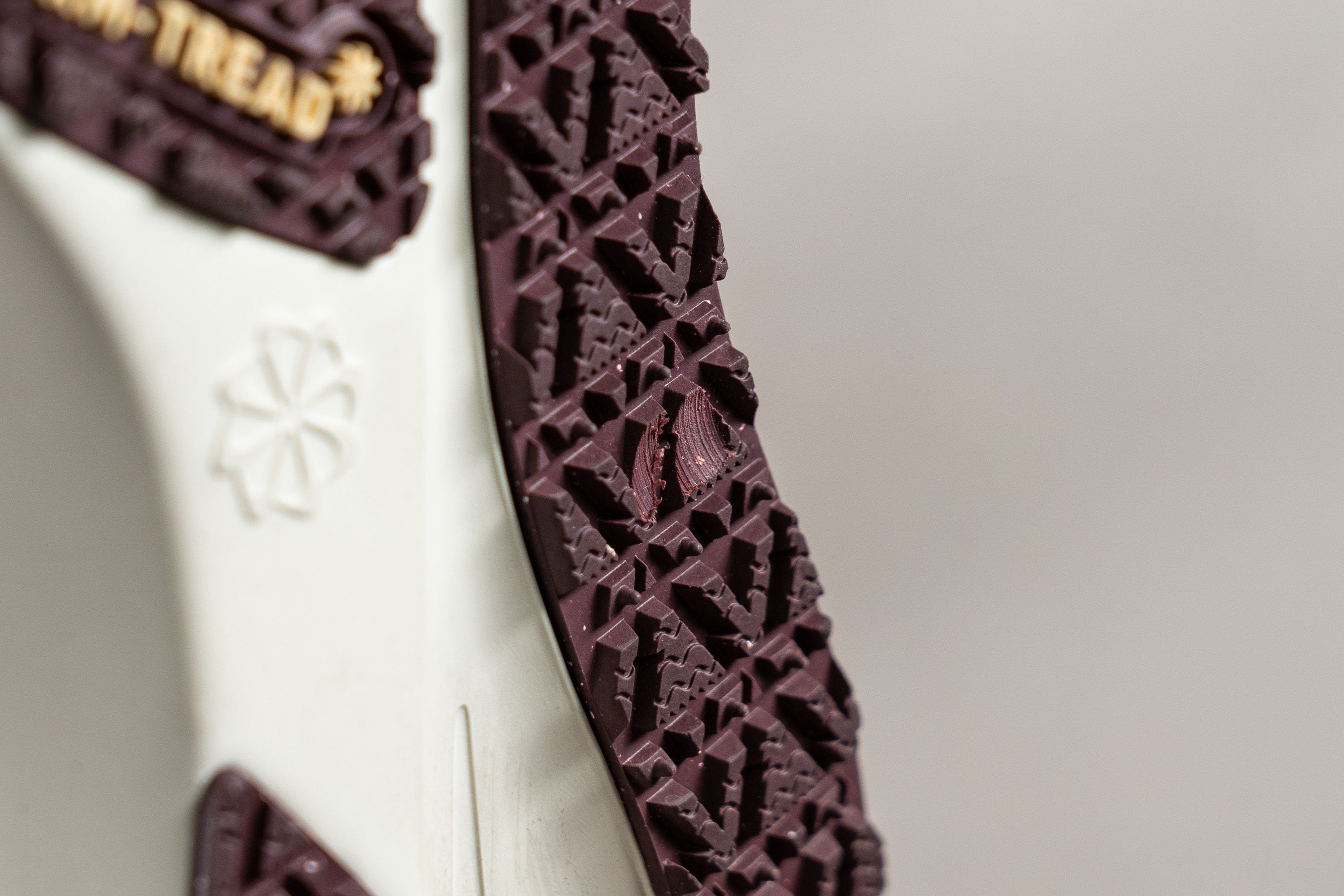
| Pegasus 41 GTX | 2.2 mm |
| Average | 1.1 mm |
Outsole thickness
It was nice to find a 4.0 mm outsole thickness—slightly above average—which should help mitigate the potential for excessive wear. However, it does contribute a slight increase in weight.
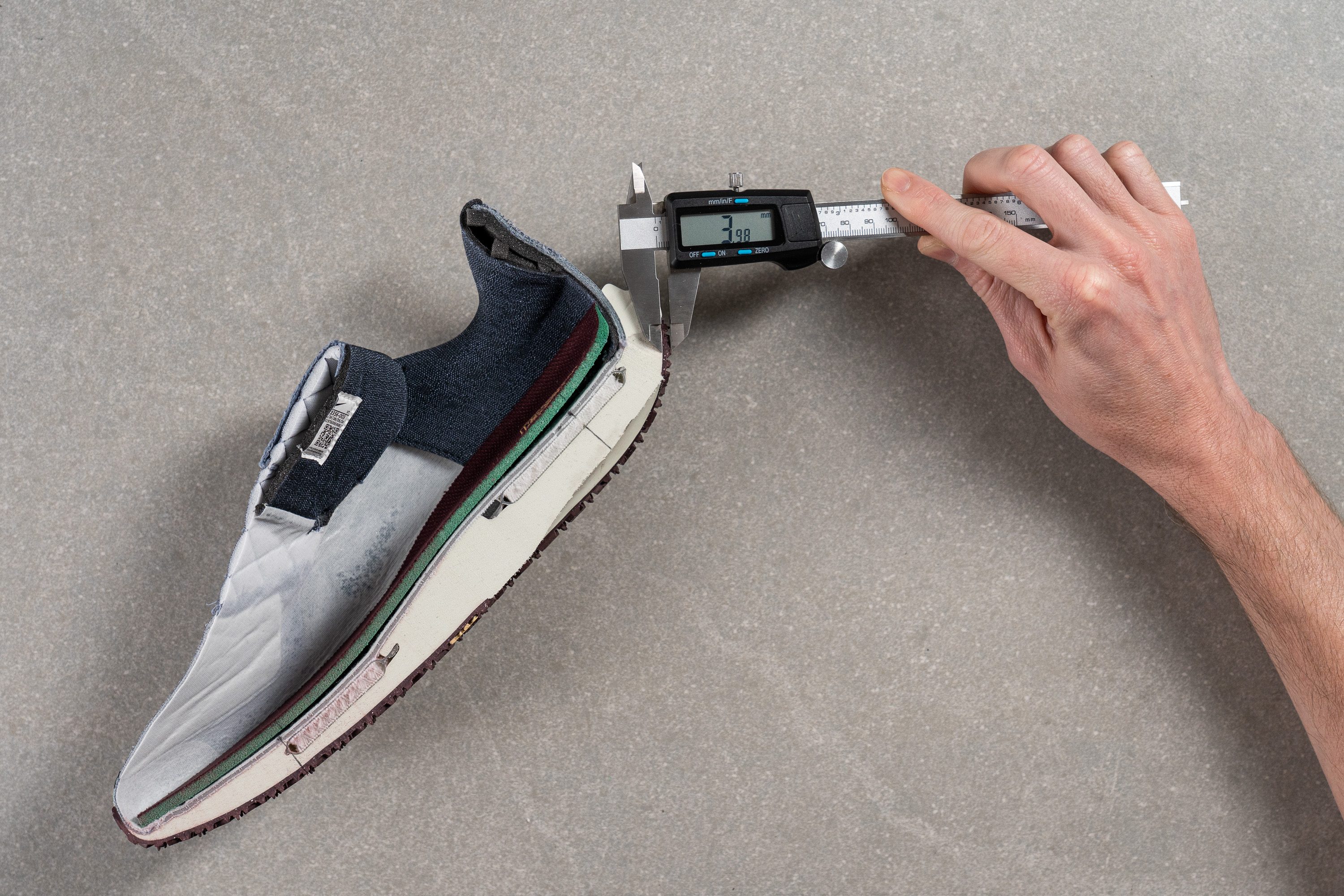
| Pegasus 41 GTX | 4.0 mm |
| Average | 3.2 mm |
Misc
Insole thickness
The insole measures 4.4 mm in thickness, placing it well within the average range.
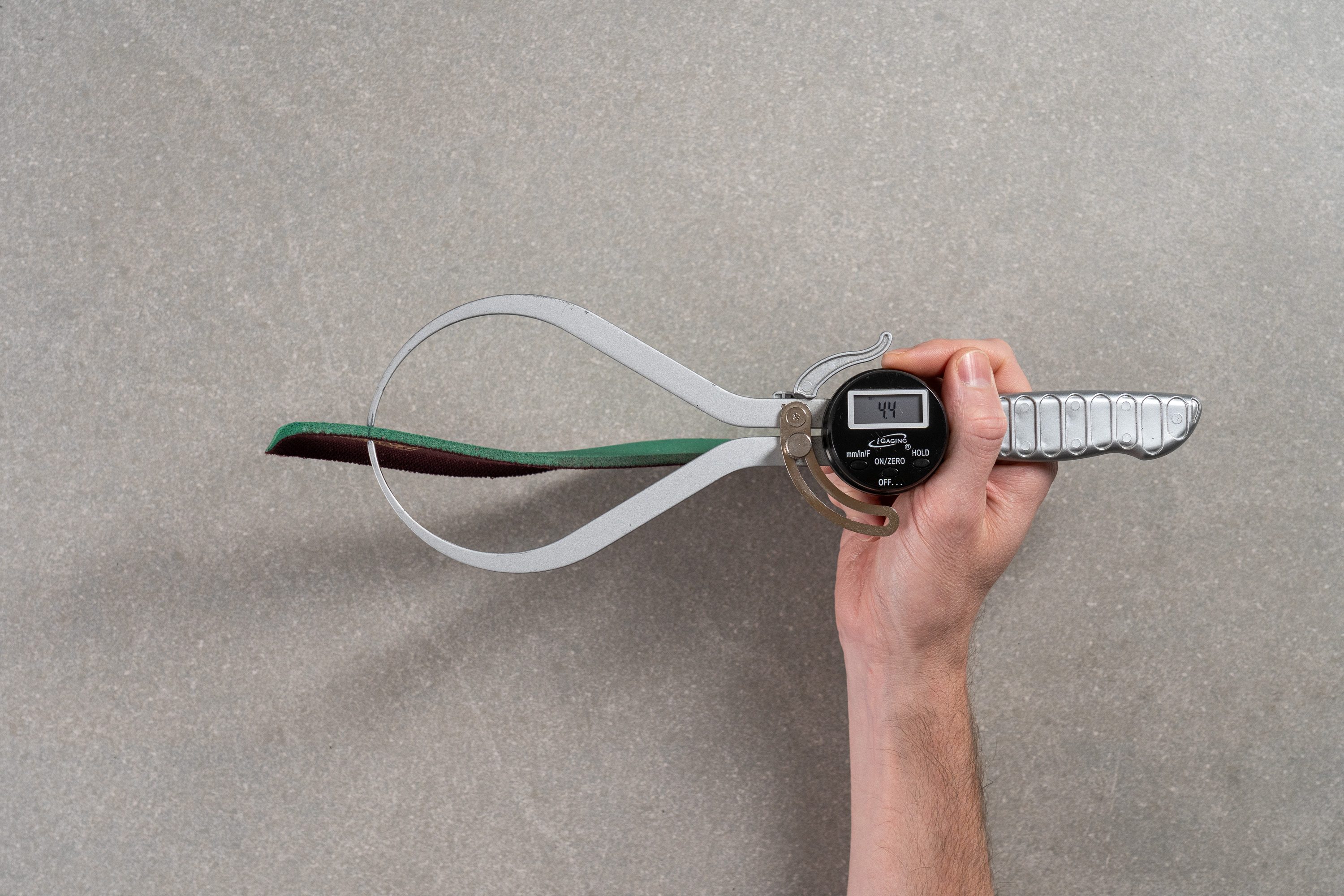
| Pegasus 41 GTX | 4.4 mm |
| Average | 4.5 mm |
Removable insole
The insole is identical to that of a regular Pegasus, but it features additional text highlighting the shoe's technologies, such as the Gore-Tex upper and Storm-Tread outsole.
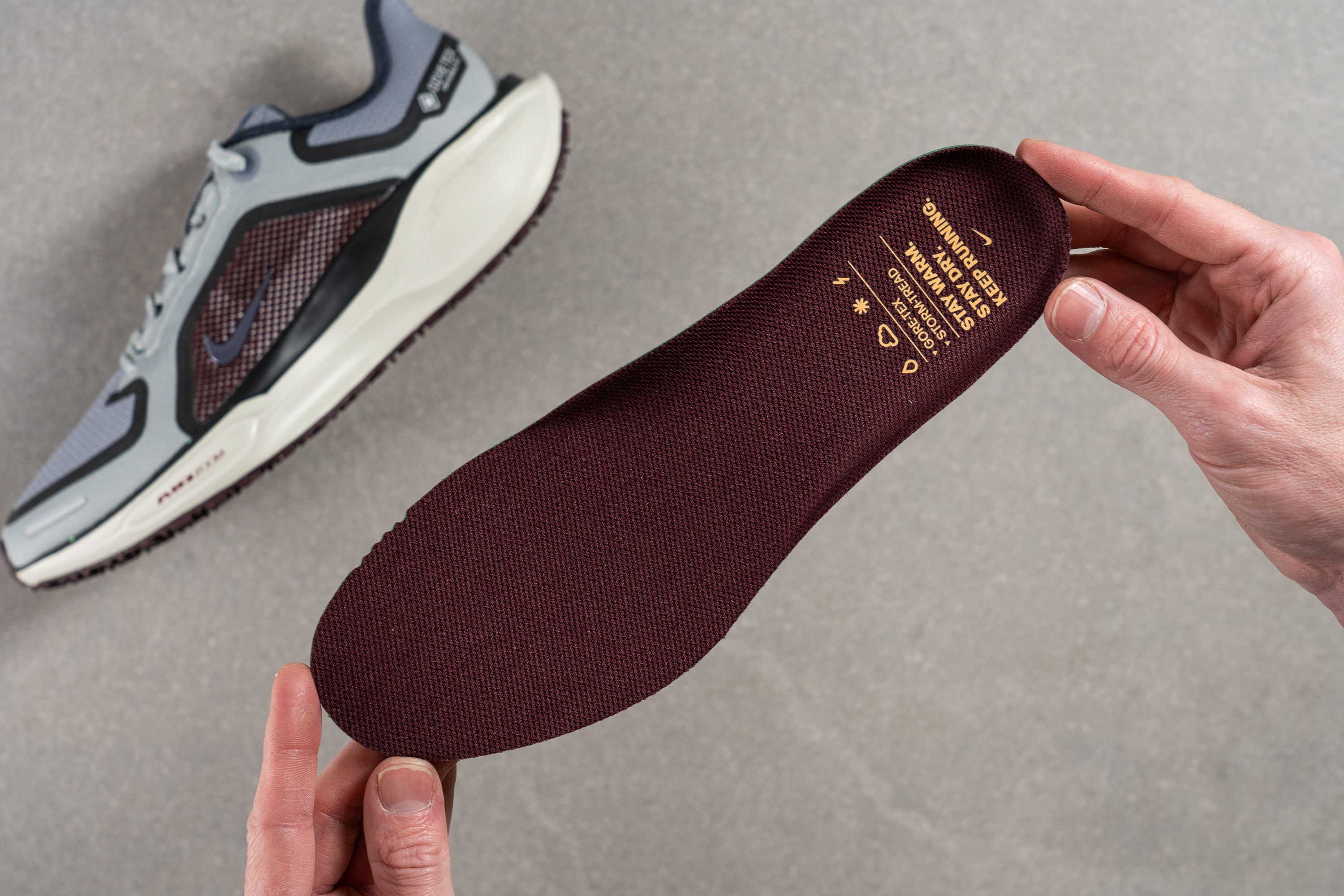
| Pegasus 41 GTX | Yes |
Midsole softness in cold (%)
Gore-Tex running shoes are widely used in winter conditions, so we tested the foam's performance in freezing temperatures. We placed the Peg 41 GTX in the freezer for 20 minutes and retested it with our Shore A durometer.
The results were underwhelming—it became 37.2% firmer, reaching 26.8 HA, a noticeable difference. However, the Air Zoom units are not affected by cold temperatures, and for this reason, the ride didn't change as drastically as the numbers might suggest. Still, we really hoped for a better outcome in this test.
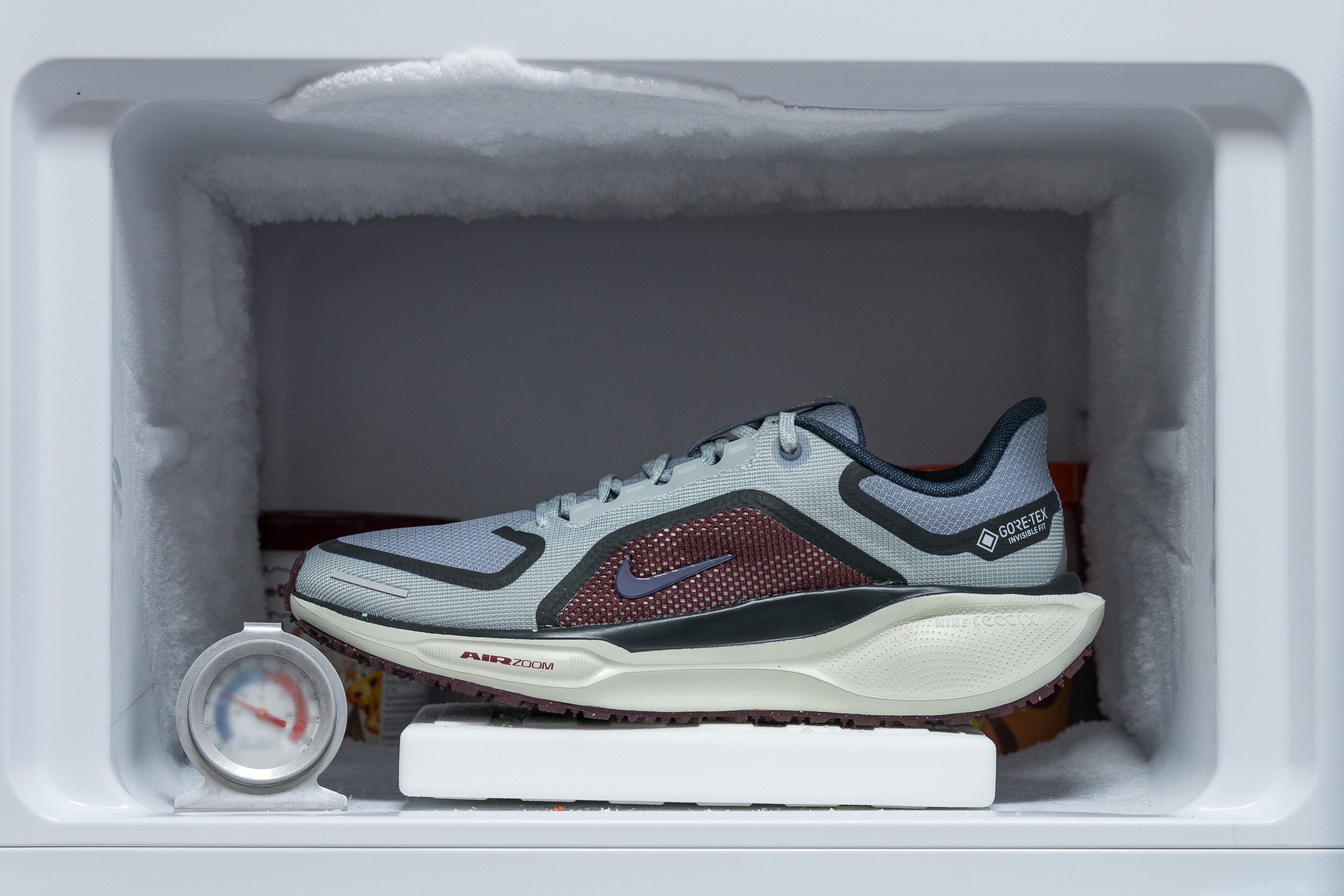
| Pegasus 41 GTX | 37% |
| Average | 24% |
Reflective elements
Every all-weather running shoe needs reflective elements, and we’re thrilled that the Pegasus 41 GTX delivers on this front. Not only are they functional—they look amazing!
| Pegasus 41 GTX | Yes |
Tongue padding
We discovered a design update in the tongue of the Pegasus 41 GTX. Nike has added a secondary foam layer, a change that immediately caught our attention during testing. But why the extra material?
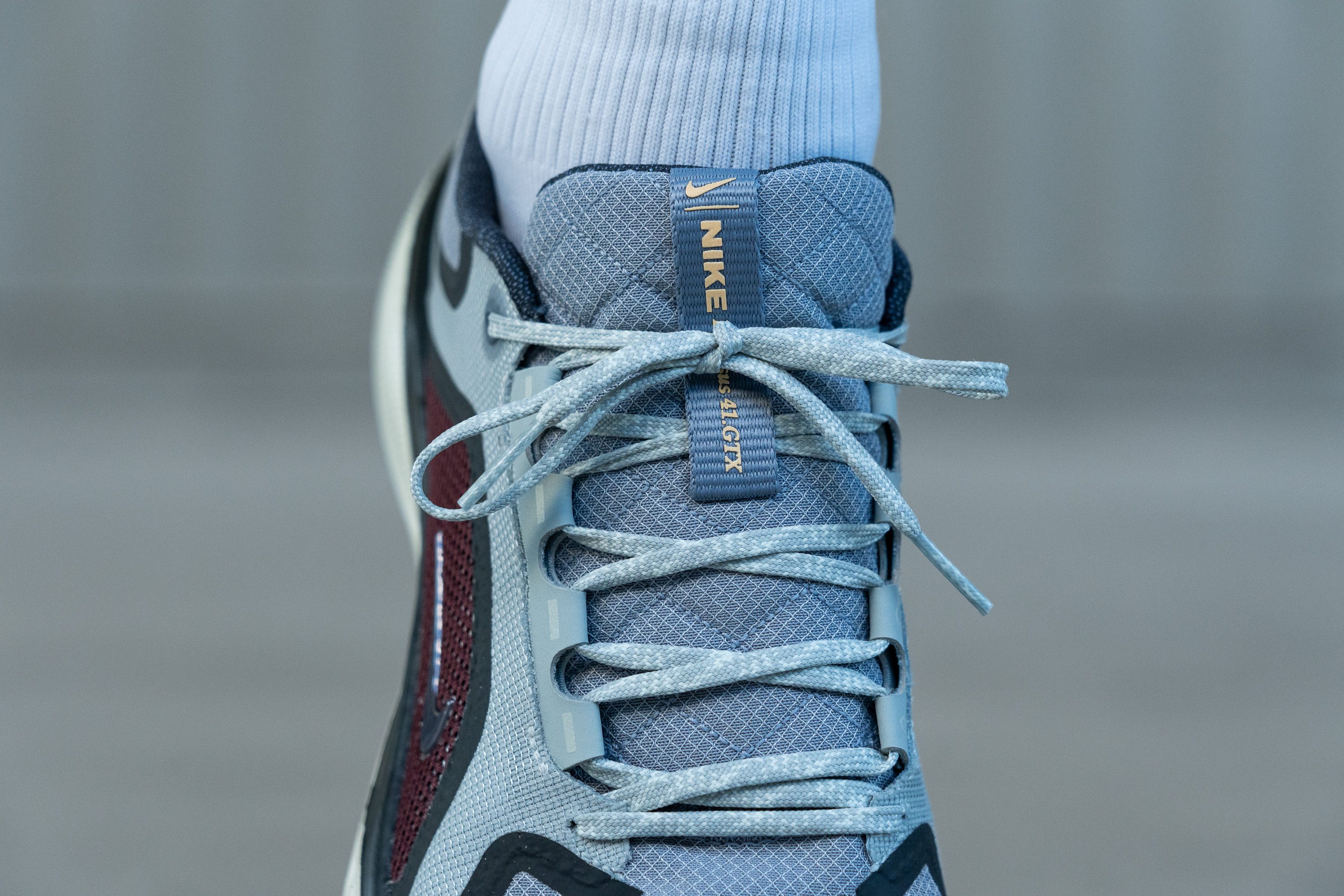
In our view, this tweak prioritizes water resistance and comfort over weight savings. By incorporating a thicker layer infused with Gore-Tex material, the tongue ensures water stays out effectively.
Through our evaluation, we measured an impressive 10.9 mm thickness—significantly more than the 6.6 mm found in the standard Pegasus 41.
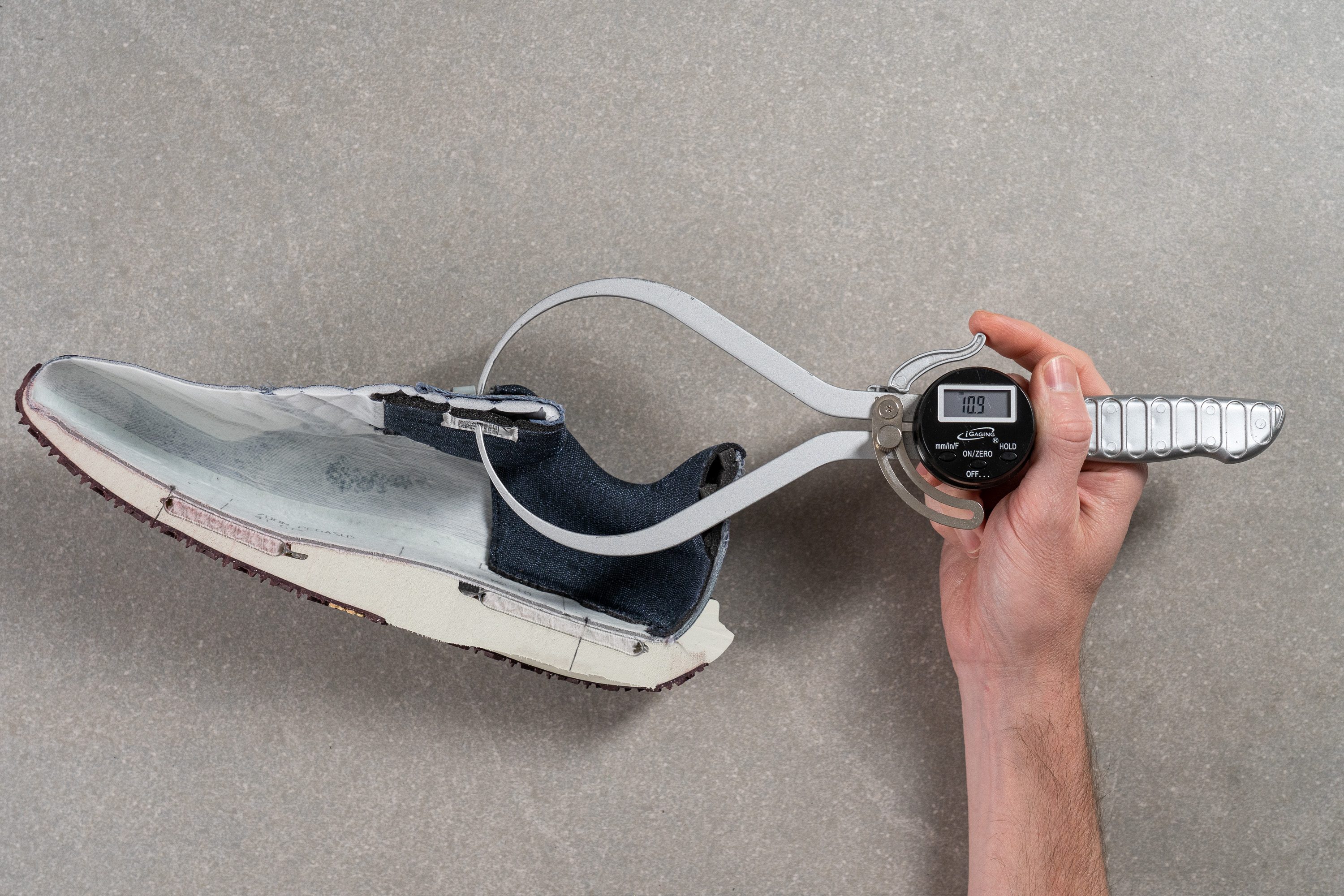
| Pegasus 41 GTX | 10.9 mm |
| Average | 5.7 mm |
Tongue: gusset type
Gore-Tex shoes prioritize keeping your feet dry, which makes a tongue fixed to the sides essential to prevent leaks. Naturally, the Pegasus 41 GTX meets this requirement with a fully gusseted tongue.

| Pegasus 41 GTX | Both sides (full) |
Price
We’d be too naive to expect the Pegasus 41 GTX to match the price of the regular model while incorporating Gore-Tex technology. Most likely, the $20 increase reflects Gore-Tex royalties and materials, and the final price remains reasonable for a waterproof daily trainer.
| Pegasus 41 GTX | $160 |
| Average | $153 |
Heel tab
This GTX edition may be slightly more rugged, but Nike still hasn’t included a finger-loop heel tab, as seen in their trail running shoes like the Zegama 2.
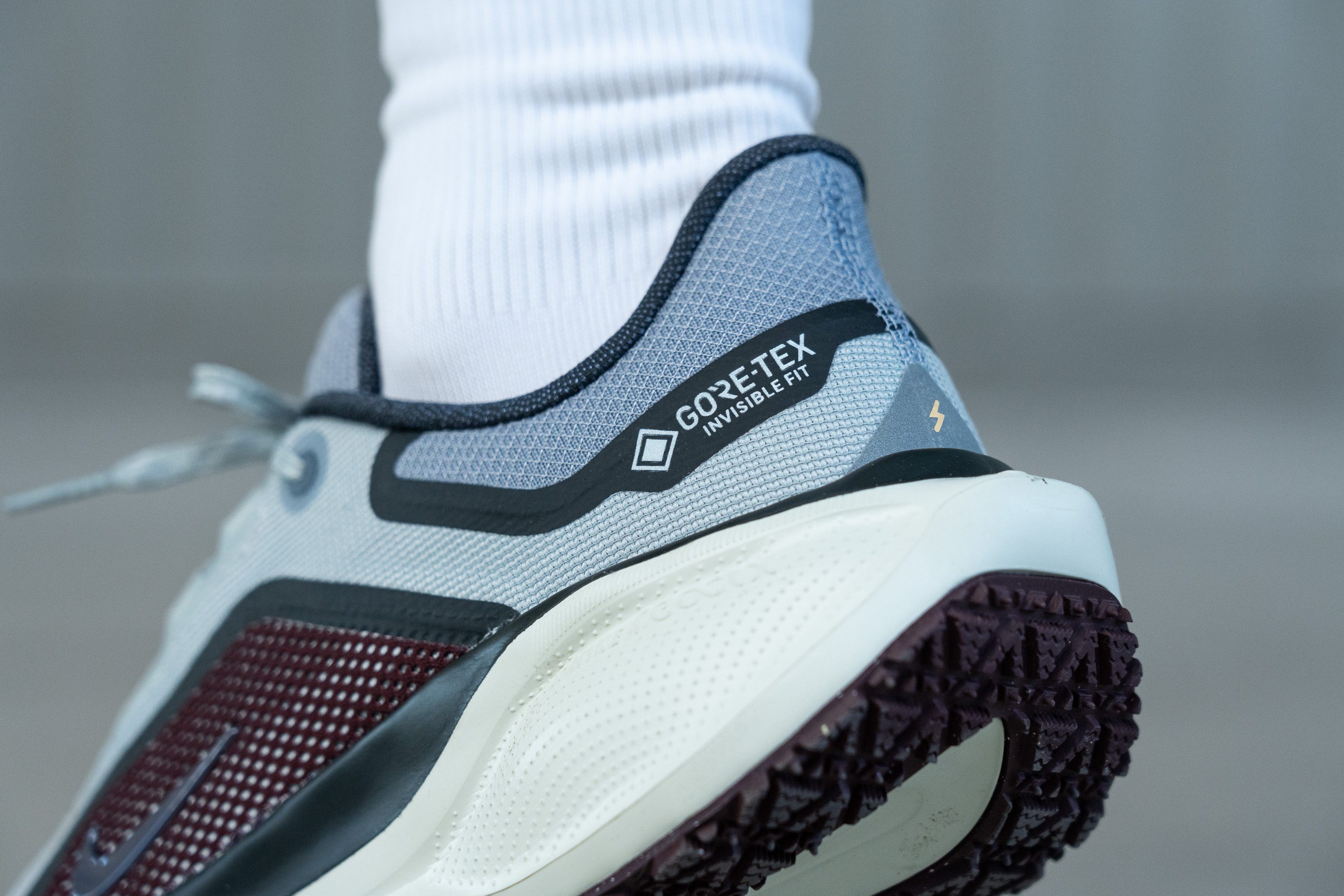
| Pegasus 41 GTX | None |
Lacing system
The lacing system in the Gore-Tex edition is nearly identical to the non-GTX version, but this model omits the extra eyelet for tying a runner's knot. This design choice prevents water from leaking into the upper—a required trade-off for weatherproofing.
What really caught our attention were the small, creative details throughout the shoe. The "nike_pegasus-41.gtx" text, styled like a computer file name, is an ultra-geeky detail, and the weather symbols on the lace loops add an extra layer of playful creativity!
